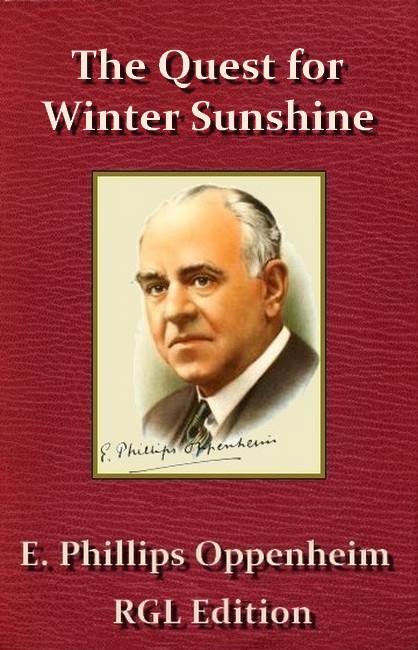
RGL e-Book Cover 2017©

RGL e-Book Cover 2017©
Credit and thanks for making this work available to RGL go to Gary Meller, Florida, who donated the scanned images of his print edition of "The Quest for Winter Sunshine" used to produce this e-book.
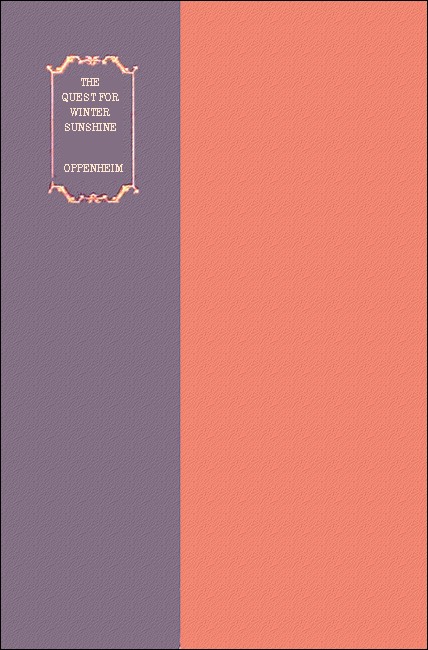
"The Quest for Winter Sunshine," Little, Brown & Co., Boston, 1927
Frontispiece
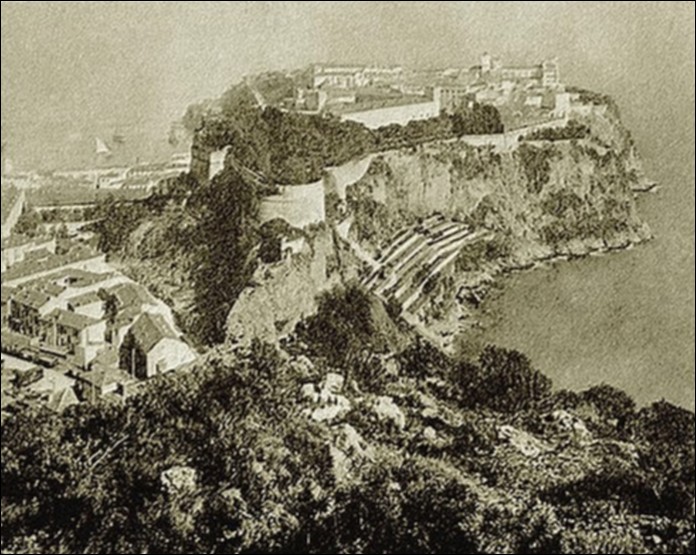
Monaco

EVERY age sees the revival of some form of actual or mythological belief, translated into modern standards and adapted to modern needs. The sun-worshipper of thousands of years ago, devotees of a very logical form of it religion, have their descendants to-day in the light-hearted crowds who, with golf clubs and tennis rackets in their kit, fill the Blue Train and join in the general exodus from the grey northern winters of Great Britain to the sunnier southern lands. It is a recent but irresistible impulse. The coal fires of the country houses and the steam heating of the cities may warm the body, but the mentality of to-day seems to become numb and frozen by week after week of lowering skies and grey mists hovering over a rain-sodden land. The call to the South becomes like the whisper of the west wind to the swallows. We book our seats for our chosen destination, and the Paris-Lyon-Mediterranean train does the rest.
Nothing in the records of our immediate ancestors gives any indication of their having shared that almost feverish desire for sunshine with which the whole world now seems to be suddenly inspired. The Continental trips of bygone days were undertaken more as a tribute to the fetish of fashion and for the purposes of some education in the gentler arts than from any genuine desire to escape from the rigours of a climate too uncomfortable to be willingly endured. The chronicles of those days treat eloquently of the picturesqueness of the old towns of France, the fascination of the boulevards, the elegance of the Parisiennes, but allude very seldom to the climate. To-day one seems content to take all those other things for granted, and to spread one's wings southwards for one purpose, and one purpose only. There is, as a matter of fact, an age-suppressed revolt against the depressing influence of our long, sunless winters, which seems to be spreading not only amongst the wealthy, but amongst all classes of society. The winter Continental traffic has increased by leaps and bounds, until it has become an amazing thing. The cross-Channel steamers are invariably overcrowded; it is necessary to book seats in the trains weeks, and even months, beforehand. The cynic might seek to account for the annually increasing exodus of sun-seeking pilgrims by the falling franc or lira. This, perhaps, may sometimes be a deciding factor to people of moderate means, but personally I have come to the conclusion that a certain change in the Anglo-Saxon temperament, evidenced to-day in their literary and artistic efforts, is also partially responsible.
Life has become more frivolous and less pompous. There exists a desire amongst all classes, worn out by a ceaseless struggle against difficult conditions, for a more gracious and easier passage towards their latter days. It is not only the physical craving for sunlight and softer airs, blue skies and the music of gently-lapping waters which draws us southwards, but also an unacknowledged, gently stirring desire for life under less severe conditions, for some degree of slackening in the more rigorous code of existence which seems to prevail under our grey and fog-depressed skies. Certainly the farther north one travels, the more austere becomes the creed of life. Calvinism had its home in Scotland, where Sunday closing is still in force, and the joyless spectre of prohibition is always in the offing. The more picturesque religion and less rigid standards of the Latin countries—countries of sunshine and ease—make to-day an irresistible appeal to a nation a little weary of its own sterner but more hypocritical attitude towards life.
Who is not weary of that grandmotherly legislation which decides when we may or may not buy a box of chocolates or cigarettes, and the exact hour at which our glass of wine— sometimes after a hard day's work—is snatched away from us; weary, too, of that school of politicians who have made their country an almost impossible place for the average citizen who objects to spending his remaining years in a state of semi-starvation for the sake of the unborn generation? Where the warmth of the sun is more generous, gentler principles of life prevail, and a far more intelligent system of national thought.
"My people of to-day must live," Mussolini is reported to have lately said, when he swept away with indignation some proposals for additional taxation. Uninspired by the vanity of a spurious patriotism, the rulers of Italy are content, as are also the rulers of France, to let their people dwell peacefully and happily in the sunshine of a temporal and actual prosperity, rather than bleed them to death for the shadowy, academic satisfaction of watching those poor, harassed phantoms of financial status—the franc and the lira—-mount on a pyramid of human misery to an artificial value.
Nothing to do with this matter of sunshine? I am not so sure. The more one wanders in countries which warm the heart as well as the body, the more one realises the analogy of kindlier feelings, the greater latitudinarianism of thought, which thrive under gentler atmospheric conditions.
Currency is rather a ridiculous fetish. The French and Italians alike, with equal blandness, equal candour, but with all their national graciousness, make very clear to us, sun-seeking sojourners amongst them, the fact that as the franc or lira rises to higher figures, so does the cost of our daily life. So also seems to increase their very sensible lack of desire for importing luxuries on an adverse exchange, and so also develops their inventive genius concentrated upon the task of making for themselves at home those goods and that merchandise they have been accustomed to buy in foreign countries. From the point of view of our politicians, France is no doubt in a parlous financial state; actually she is prospering as she has not prospered for centuries. The standard of living amongst the middle classes and poor is higher than it has ever been—far higher than our own to-day. Her industries are everywhere flourishing; she is absolutely without unemployed. Here are figures which give one to think. The precise number of men, women and children capable of work and unemployed last week (July, 1936) amounted in the official statistics to nine hundred and sixty-eight. If it is the chief duty of a statesman to keep his people happy and contented, then the much-derided statesmen of France could show our fellows a thing or two!
But about that matter of sunshine!
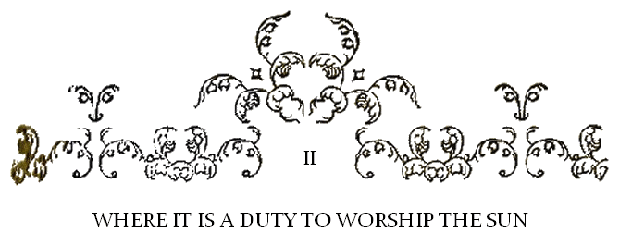
THE Intelligent seeker after sunshine learns very soon that there are many degrees and qualities this greatest gift of the Unknown. There is tropical sunshine, of which I know very little and desire to know less. In its intensity it is inclined to be pitiless. Never can one bask, happy and relaxed, and feel the joy of it creep through one's veins. It dries up the earth, burns the life and energy out of man, draws strange and scentless flowers from a parched and crumbling earth. One may watch with wonder its slow birth on the far horizon of an oily sea, or a waste of desert, but at the end of the day one breathes a sigh of relief at the sinking below the sky-line of its blood-red heart. It is like the passionate goddess of mythology who gives too fiercely and too much.
It is not the sun of which we pilgrims are in search, The full sweetness of her lies nearer home—in Algeciras, perhaps, and all that pleasant Mediterranean-girt country between Toulon and Alassio. She is at her kindest, too, in Sicily; her moods in Egypt are sometimes glorious.
Algiers basks often in her full favour, but there are times here when she reminds one of her desert cruelty, and we, her worshipping children, must creep beneath a roof and pray for the night. Then, as though in a fit of pique, she gives way to rain—grey, pitiless rain, bringing with it a chill reminiscence of home, and a dreariness of spirit which sends us hastening to Cook's for a list of steamers.
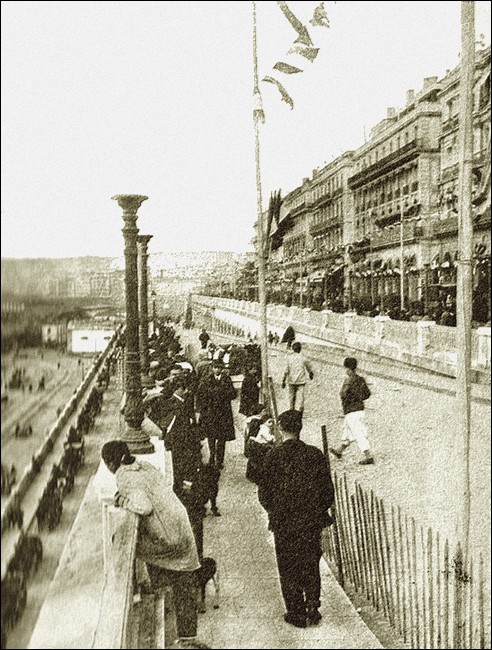
Algiers, the Promenade
Algiers to me always seems not entirely one thing or the other. There is something a little spurious about its Africanism, some quality of hardness in its sunshine, exhausting rather than recuperative. Her mid-day fierceness draws strange spicy odours from those bales of merchandise upon the wharves, from the wine vats, the olive casks and the orange-barrels, and less savoury reminders of her puissance from the piled-up goat skins in the warehouses behind. Even her own children shrink from her sometimes for hours at a time, and lie huddled up against the walls, under a wagon, or wherever shade is to be found.
The sunshine which I like best is the sunshine which brings scented flowers from a not too parched earth, which leaves the perfume in the flowering orange trees, the song in the throat of the bird; which for long hours warms you in her kindly embrace, and which drives you only for a brief space of time into refuge, to creep out again as soon as she begins to sink ever so slightly towards her western home.
The sunshine of my fancy must have a note of gentleness even in her least tempered heat. She may, perhaps, in her moods, be a trifle capricious at times, hide for a day or more, but only to come back with a freshness and sweetness which seems to make amends for her absence. There must be a note of that elusiveness about her which we love in our womenkind, so that, even when she leaves us for an hour or so, we have always with us a sense of her nearness, a feeling that she is there for our comfort and delight, and that at any moment the joy of her may pass once more into our body.
The sunshine of northern Africa is not the sunshine with which one would wish to live. It is too fierce, and at the same time too fitful.
One has to remember, however, that this business of seeking for warmth is no personal matter, and Algiers, with its mingled Gallic and African atmosphere, possesses, without a doubt, an unanalysable attraction, especially when one is fresh from the sombre skies and gloomier life of our own country. The streets are full of colour and life. The burnous-clad Arab brings, at any rate, a picturesque reminder that we are on the borderland of desert life, although he seems strangely out of the setting, loitering along the pavements and gazing into the windows of the very modern shops. The dusky-faced mendicants of the back-streets are more convincing indications of the fact that we have passed on to another continent. There are hotels to be found of every class, a few pensions and many villas now being built. Living here, however, is certainly not cheap, and the domestic service problem is almost insoluble. On the whole I should look upon Algiers as a delightful spot for the casual wanderer, or as a stepping-off place for the tourist on his way to the desert, but for any one seeking a more or less permanent place of abode scarcely to be taken seriously into account unless the lure of Orientalism is strong enough in the blood to outweigh minor considerations.
Let me be fair, in passing, obstinate Briton that I am, to the scant sunshine of my own country. There are times when one can absorb the joy of her in one's Norfolk garden, or wherever else in England one may chance to be, and nothing in the world seems more beautiful than the freshness she brings with her warmth, the soft exhilaration which comes with the joy of her. But, alas, in the full height of one's brief spell of happiness, up drift the clouds. On the morrow there is rain, the next day a grey sky, soggy turf, and dripping flowers; on the next a lew gleams of that unhappy solar deity struggling to force her way through sullen banks of mist, gleams which bring no warmth to the body, and only tantalise; on the fifth or sixth day she may come again, but by that time one's heart is a little sick.
Occasional elusiveness is a quality delightful enough, but with our English sun it is, alas, not a question of furtiveness but a question of hiding altogether. When our mistress sulks for too long, we lose heart, however great her charm. A land may be sunless, and its children remain a moral, law-abiding race, but there is a quality of happiness which they can never know.
"Ah, but so much sunshine," a neighbour of mine from the mist-bound eastern county which I still call home, remarked recently, "produces a lethargy, makes the people idle. The Latin races don't know what work means."
In my younger days I might have had the same idea; now I know better. So far from the sun developing the spirit of idleness amongst her children, it is my belief that she acts upon them as a veritable tonic. I have spent the greater part of the last five years near a small town in the south of France. I have employed work people there, I have watched the mechanics, talked to my entrepreneur, observed the springing into life not many miles away of an entirely new settlement.
I consider that the French workman works longer hours, and takes a keener interest in his job, than the British working man of to-day. The tradespeople keep their shops open later, and are to be found always behind their counters, and not at the neighbouring cafés. To observe the methods of a Frenchman who is out on business in one of the big towns is an education; to hear him talk of commerce with a possible buyer or vendor is a study in alertness. An American businessman is slow compared with a Frenchman, when the latter gets going. The tradesmen, merchants and mechanics of these southern towns, from Lyon to Marseilles, and round to Nice—which few people realise is in itself a great commercial centre—are as keen and hard-working all the lime as though the success of their lives depended upon their efforts during that one particular day. They not only work for longer hours than the English, but they usually work for the whole day on Saturday; and sport, except on a Sunday, is a thing which does not concern them. It is true that a few troublesome fête days sometimes upset one's plans, but I have never yet met a Frenchman who wasn't eager to give up his holiday and work instead, for a consideration.
In some parts of southern Italy, perhaps, my friend might find some justification for his criticism—not even there, though, amongst the tradesmen or the merchants, but amongst the labouring classes. I watched a gang of a hundred men repairing a tramway line in Naples a few weeks ago, and I must admit that their efforts were languorous. They reminded one of the disgusted comment of an American foreman who was sent a gang of fifty newly arrived Neapolitans to work under him. "And these are the . . . they make Popes of!" he exclaimed, after watching them for a short time in despair.
In northern Italy, though, and in all the great commercial centres, the operatives in the factories arc at least equal to our own in productive capacity, and the businessmen themselves equal to any in the world in enterprise and industry. Curiously enough, an Italian friend with whom I was talking the other day blamed them for their superabundant caution—a quality not usually associated in our minds with the Latin races. But, after all, nine tenths of our flamboyantly given opinions about the Latin races on based on ancient prejudices, and with us nothing dies so hard.
No one who has spent any time in their county, though, could ever describe the Sicilians as a lazy race. The peasant-farmer, hard-working, industrious, rises with his beloved sun, and as often as not retires with its last lingering beams. His land is always in good shape, his vines carefullly pruned, his lemon-groves neatly enclosed, he himself frugal in habits and a downright honest toiler. He is one of the sun's children, and the sun has brought him nothing but good.
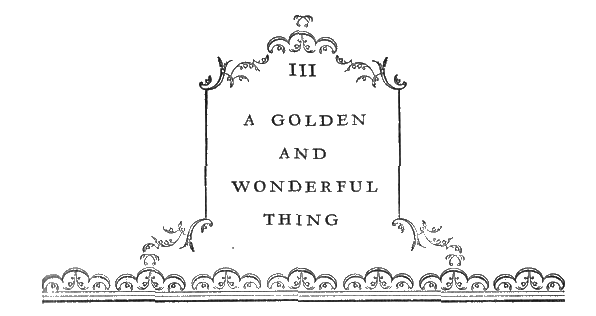
ONE recent day in February, I lay at ease high up on one of the grass-grown tiers of the ruined amphitheatre above Taormina, with the faint perfume of the wild thyme sweetening the air, and a vista of the ancient town, with the blue sea below, framed in one of the tottering grey arches before my eyes—and the February sun warmed me, body and soul. The sunshine of Italy is a golden and a wonderful thing. Inland, as far as one can see, it has brought to yellowing magnificence the myriads of lemons with which every tree seems laden; to a deeper golden the rough- skinned, luscious oranges; has painted the faces of its children that rich olive brown which no sunburn specialist has ever succeeded in imitating for the benefit of cinema actors or week-end chorus girls; and, even in places where only its morning warmth can penetrate, has brought to early blossom the luxuriantly growing Bougainvilleas.
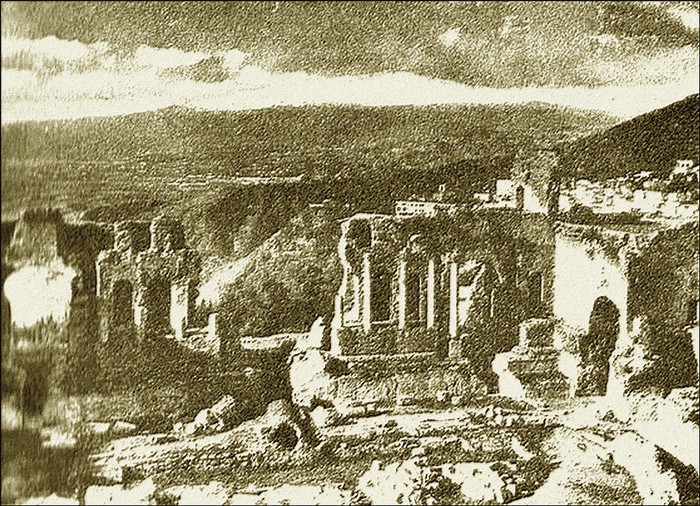
Taormina, the Ruins and Mt. Aetna.
It has drawn from the earth the deep-coloured violets, strong in the stalk, perfumed, with that faint touch of purple in the colouring which distinguishes them from the violets of northern latitudes. Already, so early in the year, there is blossom upon the peach trees, and the carefully-pruned vines, stark and still, seem to be feeling the sap of life in their gnarled interiors.
Away, over the peak of Aetna, are slowly-moving masses of cumulous, pearly grey clouds. One may watch them pass, and gain occasional glimpses behind of the deep spaces where the sun has melted a ravine of snow, to send a flood of ice-cold water hurtling downwards into the joyous warmth of the blue sea below.
The early sunshine of Italy has heaven-like qualities as it pours down upon the glad earth a living stream of gentle fire—never, in these days of early spring, with a single touch of that fierceness which drives one later into the shadowy places. It helps one to pass with light footsteps along the flag-stoned main street, whose picturesque charm survives even its suggestions of the tourists' paradise. The tall, grey buildings, on the ground floor of which are the little shops with their almost too flamboyant offerings, are cleft here and there with unexpected gaps, through which are glimpses upwards of flights of worn steps, leading perhaps to a court of ancient but grimy houses, or, by better luck, to a church, with its shrine and cross and hospitable, wide- flung doors. Looking downwards, there are still more wonderful vistas—the yellow-dusted tops of a grove of lemon trees, the flowery intervention of a peach orchard, a grey- fronted villa, red-roofed and smothered with Bougainvilleas or clematis, a chasm of blue untroubled sea below.
Commercialism is a little flagrant in this fascinating thoroughfare, triumphant though must always remain its architectural charm. It is not the free gold of the sunshine, it is the trade gold of the world for which the Sicilian's hands are anxiously extended, and in which he takes his pleasure. Manifold indeed are his wares—antiques, modern scarves of silk, designed after Oriental fashion, needlework in plenty which pleases, with a curious admixture of the necessities of modern life—American-made boots and shoes, English tweed caps, French drugs, and Italian tortoise-shell. The genuine antiques are mostly little fragments of figures or shrines from the old churches, collected one would scarcely wish to ask how, and brought in from those mountain hamlets more often than not at the bottom of a wooden box or sack of vegetables. They have their charm, these relics, wrenched, some of them, from the whitewashed walls of a wind-swept ancient church, built high up in the hills, from whose proximity the little congregation of worshiper has dwindled away to seek a more sheltered and more favourable neighbourhood on the slopes of the valley. Here they have planted lemon trees, a few vines, a few square yards of maize, and reared laboriously a new habitation, so that only the stark walls of their former dwellings remain, as though destroyed long ago by fire—a state of ruin to which in time the church also attains.
These deserted hamlets are no indication of any falling away in the population, or any lack of enterprise in their efforts towards self-support. They simply mean that a more practical generation, finding a wider market for the fruits of their husbandry, and no longer in fear of predatory attacks from their neighbours, have moved downwards towards the richer soil.
There is an oil painting hanging in state in one of the more pretentious of the shops, reputed to have been the altarpiece at a famous monastery, and the name of one of the greatest of the Italian masters is hinted at mysteriously by the judiciously reticent salesman. Such treasures, however, are not for the casual wanderer, even if they should chance to attract, so you pass on, and with the ending of the narrow street comes a richer flood of yellow sunshine, some of which you have lost in the narrow spaces. It is almost as though you have stepped out of a tunnel into the light of day. Up above are ruined castles and battlements, for the Saracens were always fighting folk, and down below, peace, with the lemon groves stretching even to the edge of the sea, bathed in sunshine which seems full of life and fire and wonder.
In a moment of enthusiasm you are almost inclined to retrace your steps to the classic environment of that magnificent ruin, throw yourself on the dry, sweet-smelling turf, and declare that the sunshine which is warming your body is the whole sunshine of paradise, and that further wandering would be waste of time. Then the violet dusk descends with unexpected suddenness, and the lights flash out—the lights from the mountain villages behind, climbing almost to the leaning stars, the lights from the distant coast of Italy, glittering like jewels against the dark background of the unseen land.
With the morrow comes a certain measure of disenchantment. The sunshine is still there, but a great steamer lies in the bay, and the invasion of the place by a crowd of tourists has already begun. Little carriages and motor cars, with numbers attached, filled with the usual crowd of intelligent sight-seers, are dashing up the hill, the streets are white with dust, guides are ranting at the corners.
You carry out your last night's enthusiastic intention, and visit the office which announces villas for disposal, but those on offer seem cold and bare. You have an uneasy conviction that half the world has been before you. Your hotel bill makes you gasp. The price of those two cocktails last night makes you long for the modest tariff of the Embassy! You are told that living is no longer cheap—and you remember that the mutton last night was tough! You decide to consider Taormina for the present as a beautiful dream, and to forget the nightmare waking of those concluding hours.
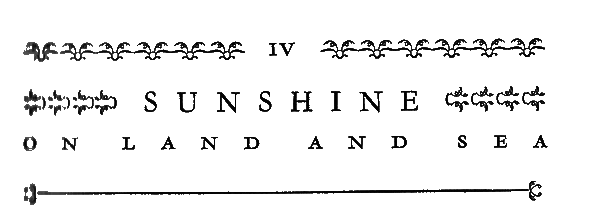
THE seeker after sunshine becomes in time a connoisseur of vintages, discovering grades and variations in what our earlier enthusiasms acclaimed as above and beyond criticism. When we first escape from our fog-bound climate, with its melancholy procession of grey skies and colourless days, any sunshine which warms our frozen veins and brings that little thrill of springtime gladness to our pulses seems wonderful. But later on, when the habit of seeking for sunshine, as the toiler seeks for his daily bread, becomes an obsession, one develops it finer sense of criticism, is inclined to quibble in a mellowed and tolerant fashion with what in, after all, very near perfection.
The sunshine of Luxor for four months in the year is, perhaps, as beautiful of its sort as anything in the world. From the inevitability of its gracious dawn, through what seems to be a transparent mist of rosy pink, to the serene, full-blooded majesty of its untroubled departure, it gives us freely and unfalteringly of the great gift which we seek. Although, in a sense, its charm may find its way a little gradually into the hearts of us westerners, accustomed to a more florid type of landscape, how beautiful the country which each day basks in its warmth—that silvery belt of desert land with its oases of cultivation, its green and flowery patches of vegetation. There is a strange beauty, too, about the Nile, as wide here and majestic as at Cairo, four hundred miles north, carrying on its broad bosom the graceful dahabeah, the smaller sailing boats with their brightly-clad fishermen.
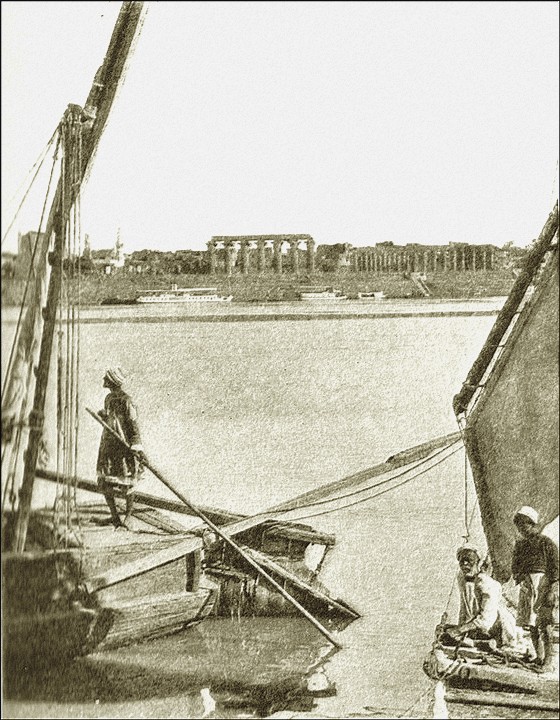
Luxor and the Temple.
Away from the river banks, towards the Valley of the Kings, there is a certain dreariness in the colourlessness and desolation, but on the other side of the river, where there are stretches of wheat and rice fields, clusters of palms, and a few Bougainvillea-covered villas, it is as though one had found an oasis of sweet colouring, an oasis with a haunting charm which follows one back to the newer world. The serious side of Egypt, the majesty and wonder of these revelations of past civilisation and splendour, make our own utilitarian passage through the greyer places of life seem sordid and unbeautiful. Almost we are inclined to fancy that there was a lamp hung on high in those days, the light of which has become dimmed for us.
Speculations of this sort, however, make for unrest, and, personally, I should never fancy a day-by-day life amongst such surroundings. One may lounge for a few hours or a week upon the terrace of the hotel, watch the glistening splashes of the Nile through the palm trees, and rebuild in our minds the panorama of the past, but ours, after all, just now, is a more sensuous mission. It is the sunshine of which we are in quest. Here, like the lizards, we may bask in its full and glorious profusion. No hint of a cloud dims the deep blue of the sky. It is as though the gracious lady of our dreams were opening her arms wide, giving without stint or reserve. To cavil in any way, to exercise that hypercritical sense developed by principles of comparisons, seems an ungenerous act here, when what we have sought is offered so freely.
Yet one has one's fancies. Sometimes, half shamefacedly, one is inclined to speculate as to whether there is not a touch of hardness in the serene and even fire of this Egyptian sunshine, something a little overpowering; whether—if you might reduce such a matter to the analogy of sex— there are not masculine qualities in its unchanging heat, as compared to the gentler, more feminine warmth which brings to one's senses the softer stimulus of aesthetic intoxication, the languorous content of bodily and mental well-being. The sunshine of Luxor is a great and glorious thing. It is scarcely, however, the sunshine which warms the heart to peace with the world and life.
I think one could be happy enough at Luxor, especially if the peculiar charm and mystery of the Egyptian landscape make sufficient appeal. Egypt, as we all know, is no longer the country for any one of strictly moderate means, but at least the prices of Cairo do not prevail here. There are some smaller hotels where, for an extended stay, reasonable terms can be arranged, but these are, alas, too close to the dusty and noisy streets for real comfort. There are a few villas too, almost hidden in a wealth of greenery, and gardens sloping down to the Nile. The rent asked for them, however, last time I was there, when one was occupied by a distinguished novelist of my acquaintance, places them outside the pale of all general consideration. Luxor is easily reached, and in most luxurious fashion, by sleeping- car train from Cairo, but it is more a home for the Egyptologist pure and simple than for the ordinary human being seeking to continue an everyday life under gentler and sunnier conditions.
Sunshine at sea, with the eternal sobbing and sighing of the wind in the
rigging, is rather like a cup of strong wine, heady in its exhilaration,
stimulating rather than soothing to the senses. Its kingdom seems
illimitable. A million dazzling gleams of silvery fire reflect its
brilliance. In rough weather the whipped spray is transformed in mid-air into
a cascade of diamonds, the tranquil ocean becomes a rocking sheet of
iridescent splendour. The wind and the tang of the sea form, with the
sunshine of our desires, an intoxicating trinity.
Yet, there is some quality about the sunshine in which we revel joyfully on the ocean which places it in a different category from the sunshine of the land. In the garden of our fancy, when the skies are blue, and the greatest joy in life is in the heavens, its warmth not only steals into our bodies, lulls and soothes our senses, sweetens our pulses and our thirst for life, but gives, also, of its glory to the flowers and to the grass, the budding trees and green earth. Throughout the long day, not only we, but the whole world, seems to drink in its sweetness. It radiates from the blossoming hedges, the trees and the meadows. It is reproduced in the song of the birds, the perfume of the flowers, the murmuring of the insects, the joy of life in the humming bees or the swiftly-darting lizard. It is like a halo upon the land.—But, alas, the sea has no home for its beneficent mistress, after it has once tasted of her splendour. The hard white decks of our steamer show no signs of glorified life where its burning rays have lingered, any more than those flowers of the sea, far down in its mysterious depths, can profit by its warmth. Mankind is, after all, gregarious, and would share his happiness, if only with the grasshoppers. But at sea the sunshine is for man alone.

I HAVE heard of people visiting Corsica in search of sunshine, and finding it. They have the advantage of me. I have been there twice, and found nothing but rain! The country behind Ajaccio, through which I motored during the brief intervals of moderate weather which we were vouchsafed, seemed to be beautiful in a rocky and picturesque fashion, reminiscent, naturally enough, of a more prolific and richer-soiled Sicily. The vineyards are of rough appearance, the cattle thin, and the peasants in their unusually sombre attire lack that frank graciousness of manner and speech to which one has become accustomed in Sicily and in the southern States of Italy. The only bandit I saw was at a café at Ajaccio, and the only wine fit to drink I found at Cortet.
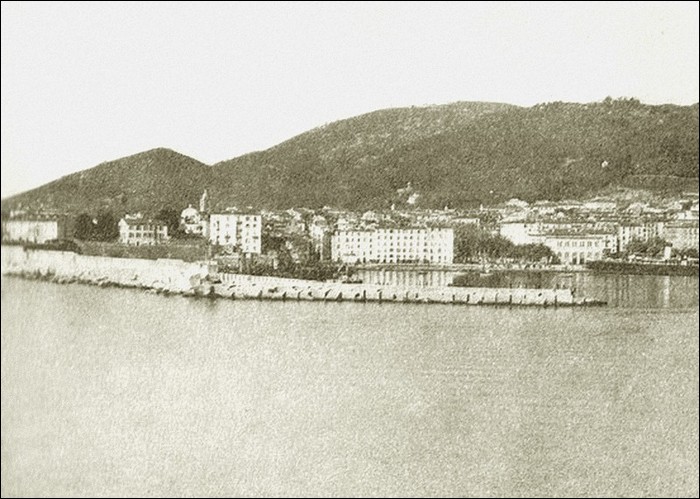
Ajaccio and its Water Front.
Nevertheless, I remember the place with some affection because, on my last visit there, driven to spend nearly a fortnight through incessant rain and rough seas on board a small yacht in the harbour, I completed the first draft of an entire novel! Curiously enough, having landed the next morning, with great difficulty, to visit a barber, I confided to him my experience.
"You," he remarked, "are not like the last author who visited here. He came to write a novel about the place, but the sun shone every day, and he was so charmed with his explorations in the interior that when the time came for his departure he had nothing but a few notes to take away with him."
Afterwards I discovered that this more fortunate person was Joseph Conrad!
I would hate to seem unfair or prejudiced about any place, but this is a slight collection of personal impressions, in no way intended to achieve finality, and therefore I may say that the only impressions I brought away from Corsica were of some very fine pine forests in the interior, some wretched roads, and vast stretches of stony land, a lukewarm regard for a population of poverty-stricken appearance, and of Rain: rain-soaked streets with great puddles like muddy lakes; rain-dripping quays, slippery and dangerous in the imperfect light; the smell of soggy mackintoshes as one crowded into a dinghy and felt the drops from the next person's umbrella trickling down one's neck; the rain-drenched decks of the little yacht which had been lent to me by a kindly friend; rain pattering upon the cabin roof, rain streaming down my porthole window, morning, noon and night. I found no sunshine in Corsica!
Algeciras consists mostly of an hotel, which is more like a hospitable
palace, an hotel wreathed in flowers, impressive with its Moorish
architecture, its great spacious courtyard, its terraced gardens, and
magnificent palms. There are flowers of unexpected varieties, considering the
hardness of the soil, the Bougainvilleas are in themselves a rich feast of
colouring and, for spectacular effect, there is the bay with its crowd of
shipping, less sinister now since the war, but reminiscent always of grim
possibilities.
On the right, the more picturesque Spanish coast stretches to the farthest point of the Straits, and on the horizon the shadowy outline of Africa divides sea and sky. It is hard to find the country behind Algeciras itself anything more than vaguely interesting, with its scrublike forests of cork-trees, its lack of colour and its lank- faced, sour-visaged Spanish peasants. The terraces of the gardens of the hotel are its chief glory, and its grove of trees, to which at night comes a strange rush of birds, only to depart in the early hours of the morning—birds of whose habits and origin everyone professes ignorance, but which certainly lend an air of mystery to the place. In the gardens are many sheltered corners where one may lounge in a flower-scented silence, and bask in the sunshine, which is, alas, in the early season of the year, a little fitful, but always with qualities of warmth and never wholly disappointing.
I always feel that Algeciras has an atmosphere which I have failed to catch. Perhaps the continual crowds of English people from Gibraltar, or tourists from one of the frequent steamers, give a sense of unreality to the place. It seems as though that wonderful corridor and those Oriental-looking gardens with their flowery background were just a scene in some musical comedy, and that these well- dressed, jargon-speaking Anglo-Saxons, nearly all of a certain type, who appear at times to take such complete possession of their surroundings, were just the moving chorus, so that the whole thing becomes quite fantastic, and could never by any possibility exist in actual life. The fact of the matter is that the setting is too small. It is a place in which we put one foot, but the other remains in England. Nevertheless, its gardens, with their wealth of colouring and sunshine, and the views of the glittering bay, contain their own peculiar beauty, and on the days when the launches from Gibraltar are few, and the tourist steamers are not, Algeciras possesses a very pleasant and inspiring tranquillity.
And then, a little farther north—a short distance in any country except
Spain—is Seville. Here, at the proper seasons of the year, is sunshine
in plenty, but there are also occasional catastrophes in the shape of a
devastating east wind which brings with it clouds of the white dust which
lies thick upon the hard country roads. On a perfect day though, with its
garden-bordered plazas, its arches of acacias, its beautiful houses, so
quaintly protected in old- time fashion from the over-curiosity of the
wanderer, its gay, well-dressed throngs of happy promenaders, Seville is
certainly unique of its type, a pastel of sparkling and brilliant life. Here,
too, in the outskirts, are to be found trees, so lacking in Spain; the whole
surroundings of the place, indeed, except along the borders of that terrible
road by which it is approached, show signs of a somewhat richer and more
luxuriant vegetation than usual in this country of windy hills and passes, of
rock-strewn landscapes, of scrubby olive trees and struggling
vines.
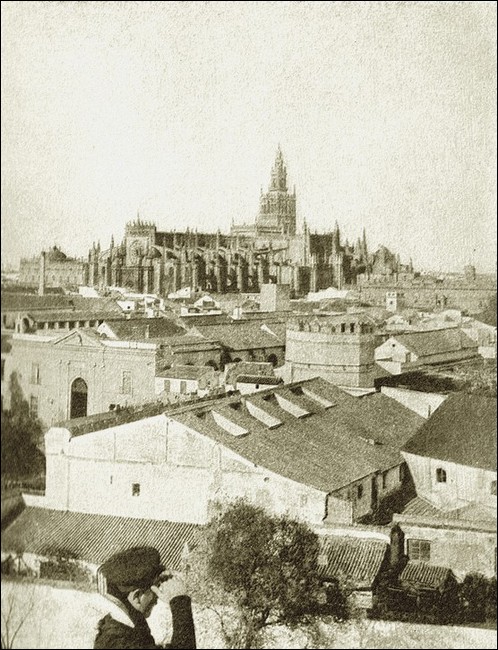
Seville, the Cathedral.
Seville in its way is a gem amongst cities—less rich, perhaps, in architectural wealth than some of the other treasure spots of Spain, but still a happy, joyous place with some trace of that humour to be found in the bright eyes, the lips ever ready to smile, and the jaunty bearing of its children, which reminds us of the famous Don Pedro, concerning whom there is still told with relish a certain story so quaint, so indicative of the spirit of his people, that however often one tells it one is tempted to tell it again:
The great Don Pedro, like many other princes of the Middle Ages from Bagdad westwards, loved secret and nocturnal adventures, and was a frequent wanderer in the streets of his city. One night, on his way to pay a belated afternoon call, he found another gallant serenading the lady of his momentary infatuation, engaged him in fight, as he was always ready to do, and killed him. The gallant, however, was a nobleman of quality, and trouble followed. Don Pedro, confident that his disguise had not been penetrated, and aware that only one old woman had been a spectator of the combat, sat in his court and demanded that the murderer be brought before him. The old lady was nonplussed. With an ingenuity, however, the reproduction of which one seems to find in the spirit of the laughing crowds of to-day, she prepared with the utmost care an effigy of Don Pedro which she brought into the court.
"There, Don Pedro," she announced, "is the murderer!"
There was probably some slight embarrassment in court, which, however, was not shared by the person chiefly concerned. He congratulated the old lady and promptly sentenced the effigy to be hanged—justice which seems to have satisfied all concerned.
Seville, however, for all its charm, and its frequent wealth of sunshine, seems to me always rather a place for the scholarly tourist than for the resident. Strangers are welcomed only with words. The place is indeed typical of the whole country, amongst the population of which there seems to exist an almost passionate disinclination to enter into any sort of intimacy with the wanderers from other lands. Spain merely shows her treasures—and bids us depart. But one can console oneself for her inhospitality by the reflection that her climate is treacherous, the conditions of any form of social life impossible, and her cooking, except in Madrid, atrocious.

ON the whole I like Hyères, which may perhaps be considered as the western outpost of the French Riviera, and it is certainly to be taken into serious account by the sun- seeker searching for a spot in which to pitch his tent. In my younger days, it was a paradise for the poverty-stricken. The equivalent to four or five shillings a day provided one with perfectly adequate accommodation even though one had to stay in the town itself instead of mounting the lordly slopes to what is now an hôtel de luxe—the Golf Hotel. Those days have unfortunately passed, but the place still offers many attractions to the person of moderate means. In the heart of the town, but pleasantly situated, are many large and quite excellent hotels, where accommodation can still be had at very much lower prices than in the fashionable resorts nearer the real centres of the Riviera. There are villas here too, in plenty—less pleasantly situated, perhaps, than in some districts, from the fact that Hyères itself is some kilometres distant from the sea, but most of them with the compensation of gardens, and, if their immediate surroundings are a little lacking in specific attractiveness, they are at least situated in a neighbourhood with a hundred outlets into very beautiful country.
At first sight, especially to the traveller who has arrived by train, the approach to the place is not particularly encouraging. The palms which fringe the long boulevard leading to the town have a dejected air, owing to their proximity to the dusty road, the shops are characterless, the hotels, although large, externally uninteresting. One feels that the place lacks atmosphere, yet, beyond, when one climbs the avenue which winds upwards from the main road to the caravanserai dominating the golf links, one begins to realise how it is that Hyères has obtained its vogue.
The links themselves, on a perfectly flat strip of country, negligible to the serious golfer though they certainly are, possess a quaint sort of attraction, hard to put into words. I have picked here, only a few yards from the fairway, the earliest spring flowers: anemones, growing so thickly that as you stand upon the tee you see a little carpet of pink and purple on your right, gently-growing flowers which bend with every breath of the slightest breeze—and, on the left, a clump of stiffly-growing but sweet yellow narcissi. In the spinney farther away there are always violets, and, as the spring draws on, a plague of bees makes the approach to one of the holes—I believe it is the sixteenth—a matter to be considered with some diffidence. Their gentle murmuring seems to take one back to an English meadow where the cows are standing swishing their tails, knee-deep in the rich grass, and the cowslips and buttercups and daisies are starring the fields with yellow and white; or to an old-fashioned garden with hollyhocks, sweet Williams and mignonette scenting the air, and in the distance—in the shelter of a yew hedge perhaps—a neat row of hives.
We cross the road at one part of the course, in pursuit of our golfing activities, and, if we linger in this corner of the world long enough, there is an orchard of cherry trees whose perfume alone is sufficiently intoxicating to atone for a misspent morning doing homage to our national fetish.
Why must we Britishers drag our games with us, I wonder, into all the beauty spots of the world? England, with its chill days, its inevitable associations, almost demands our tribute, generally too lavishly paid, upon the altar of sport, but here, where exercise is less a necessity, it seems that one might do better when one has come to a land full of unexplored beauties, than to make ourselves unpopular by taking away the peasants' land to make a golf course, and continuing with grim seriousness the routine of an English holiday with cup days and medal days and competitions to distract our thoughts from more worthy things. The call of the sunshine in which this country is bathed, after the rain and cold winds of early spring at home, might lure us to better doings.
Hyères is scarcely the centre of the most picturesque part of the Riviera, but it has surroundings full of their own peculiar charm. There is a pleasing and pastoral serenity about its long strips of rich, well-tilled land, the tender shoots of the young wheat, the vineyards looking in springtime as though some careful housewife had dusted and trimmed each morning the sturdy shoots.
Here, too, are the first of the violet farms—soft, alluring carpets of purple and blue, with little narrow footpaths between the blossoms, along which passes the Frenchwoman with her basket; generally she is a woman of past middle age, with a touch of vivid colouring somewhere about her, and a face looking as though it were carved from the wood. In the old days, Madame accepted a few francs with gratitude, and bade one pick here and there as many of the sweet-scented flowers as one cared to carry away. To-day things arc sadly different. There arc numbered market baskets to be scientifically filled by professional pickers, and stowed away on a Citroen farm car. Madame of to-day is still polite, but the wanderer who simply wishes to fill both hands with her blossoms is scarcely welcome. She is too fond of money still, however, to refuse even a five-franc note, but you are no longer free of her scented paradise, and it is a very small bunch which is twisted together by skilful fingers and proffered to you.
There is something about this part of the world reminiscent at times of our own countryside in midsummer. For instance, there is a genuine footpath by the side of a small river which winds down from the background of hills encircling the place. The footpath passes through small woods where the undergrowth is starred with anemones, and where occasionally the singing of birds is to be heard. In the open country it threads its way through meadows where the herbage is deeper and richer in colour than is common in this part of the world, interspersed, too, with many strange grasses which quiver in the slightest breeze, and where, here and there, one finds some of the simpler flowering weeds, pleasant enough to look at and smell, even if they lack the more intoxicating perfume of the violets and cherry blossoms. Here is a good place to repose for a time, to lie down in a corner by the side of a grey stone wall—choose the corner where the wild violets are growing, and a little tuft of narcissi is blossoming in a crack between the grey stones. A good place to lie down with your hands clasped behind your head, to feel the warmth of the sun creep through all the nerves of your body, and give thanks for that spirit of wandering which bade you leave behind for a time the fogs and grey skies, the necessities of work, the daily passage along the sloppy pavements, or in the musty taxicab along the muddy streets. If you can make up your mind to leave those golf clubs alone for a time, so much the better. Attune yourself to the climate, let the spirit of languor creep through your pulses and into your heart, repulse that customary desire to be exercising limbs and body rather than the gentler senses.
This languor, after all, is not laziness. It is in moments of dreaming, with every nerve in one's body at rest, with even one's brain quiescent, with the gentle peace of the quiet places in your heart and the caress of the sunshine upon your body, that sometimes a new energy is born, new figures shape themselves in your brain, and even new ambitions are conceived. I often think that in our daily life mental rest in the beauty spots of the world appeals to us too seldom, finds too small a place in our programme of living and being, and I fancy too that the sunshine helps us to realise it.
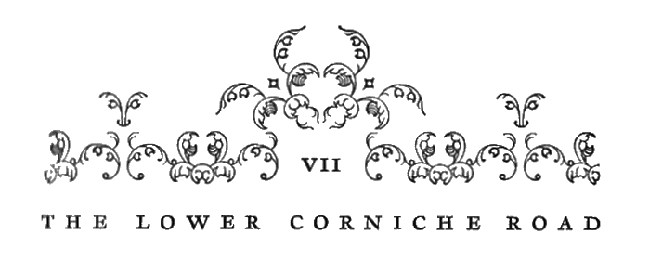
THERE was a hot day—towards the middle of last November, I think it was—a day full of sweet odours, when I flung myself at full length upon the yellow sands, with the blue Mediterranean lapping idly at my feet, leaned back against the trunk of a pine tree, drew in one long breath of that sweet fragrance, and swore that I had found my El Dorado, and that where I was I would live and die.
Then I slept—slept, mind you, not dozed—with that perfume lingering in my senses, and the swishing music of the sea in my ears. When I awoke, the inspiration was still with me. I made a pilgrimage to the pine-grown slopes behind, accompanied by a voluble but persuasive land agent, and I considered plots of land. It was the old story all over again. Plots with sea frontage would have needed the gold of a fairy prince; plots on the near and sheltered part of the hillside were sold. There they were, all staked out like lots in a cemetery, and not even my eloquent friend was able to persuade me that the land which remained was really the best of all.
There are many pleasant little spots between Hyères and Beauvallon, but Beauvallon will always remain one of the most charming corners of the western Riviera. Sunshine and sea, pine woods and the sheltering mountains, with a view of the ancient town of St. Tropez over the bay! What could man want more? And yet, when one closed one's eyes, and fancied villas built on all those marked-out spaces, one felt some of the charm fade away; one's gregarious instincts faltered before even the faintest thought of a growing garden city. I love my neighbours, but not building houses!
But what a coast! Hyères lacks the joy of a sea frontage, but here the road winds its way for many kilometres within a few yards of the softly lapping waters of the Mediterranean. There are sheltered places which might be corners in paradise, outjutting rocks from which one could dive into twelve feet of clear, sweet water, sandy stretches upon which one could walk barefoot until one's toes were entangled in the strange, large-leaved seaweed with its pungent odour of the ozone.
One comes presently to St. Maxime, and I have never yet made up my mind whether St. Maxime is a real place or not! There is a toy harbour, there are busy cafés with tables reaching out on to the street, notices imploring you to taste the bouillabaisse and friture du pays of the maison; "mine host", more unreal than his habitation, rotund, waxen-faced, with neatly-curled black moustache, the black apron of the sommelier preserving his trousers, his coat ridiculously short, the ends of his bow-tie flapping round his ears. In his hand is the bottle of wine he is reverently offering to his patrons, in his eyes, as he glances at the passer-by, there is a perpetual wistfulness. There are real men and women, apparently, eating at the tables, real children playing in that tiny square, and in the end you will probably do as I did—succumb, and take a table set out on the edge of the main road which reaches from Marseilles into Italy, gaze frequently across a few yards of shingle to the sea whilst you eat your well-cooked but strangely-tasting food, and drink wine a little different in flavour to any you have tasted before. I tried to get on human terms with my host, but found him, though polite, unresponsive, until I mentioned my eternal quest, my thought of some day buying a villa—a villa which must be in the sunshine, where one could be sure of sunshine all the time. It was then that my host took command of the situation. He took off his black apron, he sent for a bowler hat, and, my meal being finished, he led me out to my car.
"It is the villa which Providence must have intended for Monsieur," he assured me, "for sale by the most marvellous chance. Monsieur will settle there for the rest of his days, and Madame—the inconsolable Madame—must sell, or weep her eyes out."
So we drove a little way along the main road, turned in at a brightly painted gate, and pulled up before the strangest effort in architecture upon which my eyes have ever rested. It was pink and green; it had many angles; it had minarets, cupolas and façades all jumbled together without rhythm or sense of outline. In front was a flower garden in which there were as yet no flowers. There was a tiny vineyard, about twenty metres square, a tiny orchard, the trees of which had yet to grow, a strip of grass upon which the livestock of the establishment—a tethered goat!— was feeding. It was, as my host explained enthusiastically— "Si complet!"
And the interior! Never out of bedlam could one conceive such wallpapers, of an immense design and lurid colouring, furniture of incredible strangeness, a covered-in terrace, built to avoid the sun, with queer chairs, neatly placed in a row, and painted a bright vermilion. Madame, in deep mourning—she had just lost her husband—was there at our service, a cambric handkerchief in her hand, tears ready to flow if good might seem to come of it.
And then afterwards, what I said to Madame, and what she said to me, how I escaped from the house, how I bade farewell to my host, of what lying laudations I was guilty, what vague promises I made, I simply do not remember. I left St. Maxime more convinced than ever that there is something fantastic about the place, that it has been pushed up, or let down, from another world, and that one day I shall wake up to discover it off the map, and shall motor along the road and find nothing there but a peaceful farmhouse, or perhaps a café!
And then, following the Lower Corniche, which skirts all the time the
Mediterranean, there is St. Raphael. Many people like St. Raphael, and there
is no reason why they shouldn't. It has some pleasant-looking shops, one or
two attractive hotels, a short and rather overcrowded sea- frontage, and
beyond, villas—miles of villas—very beautiful some of them, but
somehow a little pretentious for one seeking only a simple, pleasant home in
the sunshine. Behind, at picturesque Valescure, are golf links, a little hard
going, but growing more popular every year. St. Raphael has its devotees
amongst the sun-seekers of the world, and without a doubt deserves them.
Places, however, arc very much like human beings. They attract, they repel,
or they leave one neutral. I am entirely neutral about St. Raphael; probably
St. Raphael feels the same way about me.
Valescure, on the other hand, has charm and possibilities. It is within a few
kilometres of St. Raphael, where even the Blue Train condescends to make a
brief halt, and bungalows are being industriously built amongst the pine
woods which have been wisely left undisturbed so far as possible. Here is
beautiful air, fascinating glimpses of the Mediterranean, curling into the
bays and inlets below, a golf course, rapidly improving, and two excellent
hotels on the links themselves. My only fear about Valescure is that it may
soon become almost too popular, that the bungalows will multiply until it
will rather resemble one of the latest of those garden suburbs with golf club
which are suddenly springing up around our own metropolis. But, after all,
here at Valescure we shall always have the compensation of the softer airs
and constant sunshine, so that when the faintest of west winds comes down
from those sheltering hills, the perfume of the pines is shaken into the
warmed air.
Still travelling towards my particular Mecca—when one is free from that
long arm of villadom which stretches for several kilometres—one comes
to some pleasant and livable country. Agay is a place which attracts, and
which still possesses many delightful sites for building, and, a little
beyond, on the far side of a sweeping bay, is the house of my latter-day
dreams. It is a plainly built, Provençal farmhouse, standing on the edge of
the sea, and, quaintly enough, at the extremity of a little semicircle of
perfectly level meadows which stretch back to the road—not all meadows,
though, when one comes to think of it, for there is a vineyard, from the
grapes of which I was told the best wine of the neighbourhood was made, a
cherry-orchard, and a small strip of arable land. The place is exactly
reminiscent of an exceptionally large and ancient Norfolk farmhouse, of a
severer type of architecture than that which one usually meets with in our
own country. Its stained pink walls and deep red tiles have become mellowed
with age; its front abuts almost upon the yellow sands, and behind, in place
of a garden, there is an orange-grove and an avenue of cypresses. Except for
the more exotic vegetation—the vineyard in place of the turnips, the
orange-grove instead of the apple-orchard, the mimosa in place of the
lilac—it really might well be an English homestead, a little oasis of
restful tranquillity in the midst of a very beautiful but curiously different
country. I have wondered every time! have passed along the road wherein lies
its peculiar charm? It is difficult to define, for its simplicity is akin
almost to baldness. Yet it possesses an air of peace and of gentle luxury, as
though the sun for generations had burned its way into the pinkish-grey
front, and soaked the gardens and meadows with its gentle warmth. It is
somewhat pretentiously called the Château d'Agay, and it is not for
sale—or I should not have told you about it!
The whole of the seaboard between the outskirts of St. Raphael and Théoule
possesses innumerable delightful sites for anyone desirous of building a
bungalow or modest habitation. The villas immediately upon leaving St.
Raphael are very beautiful, very large and very costly. From about three
kilometres westwards, however, there is a curving stretch of coast with many
charming little bays, strips of sandy beach, and an abundance of pines where
the rocks come down to the sea. It is a land of peace, and a paradise for the
sea-bather. The property here is nearly all for sale, and prices can be
obtained on application to a land agent at St. Raphael. There is in one part
a little promontory in a sheltered corner, where one could build to the very
edge of the sea and where a dive from one's sitting-room windows straight
into a pool of deep blue water would be perfectly feasible. Land here, for
some reason or another, has not been bought with the same avidity as nearer
the casino centres, but to the lover of a quiet life, it seems to possess
even more picturesque and sunfull possibilities.
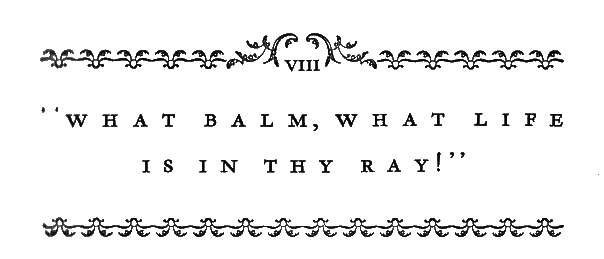
AFTER Agay, although there are some charming little bays fringing the road, and Théoule, near which there is much land for sale which presents possibilities to the sun- seeker, there is no place at which I would set up my Temple to Sol until one reaches Cannes. Just as Hyères may be considered the western outpost of the whole Riviera, so Cannes may take its place as the western boundary of that intensified strip of territory which we have in mind when we speak of the Riviera. Concerning Cannes, I feel myself a little dumb, not because I do not know it well, but because most other people know it probably as well as I do. It is one of the three capitals of the district, and if one wishes to lead the life of gaiety which one usually associates with a holiday upon the Riviera, the choice between Cannes, Nice and Monte Carlo—all three great centres of sport, society and gambling—may be fairly left to one's personal tastes and inclinations.
Cannes, with its picturesque old town and harbour, its magnificently-situated Casino, its pre-eminence in sport, will always attract the élite of the world. Its hotels are the best upon the Riviera, its shops the most expensive. It has a magnificent promenade,—the Croisette—a glorious sea, continual sunshine—although the warmth of the place is a little interfered with by the prevalent winds. There are plenty of beautiful villas in the neighbourhood, especially in the Californie district—some of these, alas, since the decline of the Russian influence, now permanently empty. It is not only the smartest place upon the Riviera, where one meets more folk who are well known in the social world than anywhere else, but it is also the centre of the literary colony. One of the greatest of our living novelists has made his home there, and upon his flower-embowered balcony, with its dazzling view of the Mediterranean, many interesting reunions, enlivened by a lavish hospitality, have taken place.
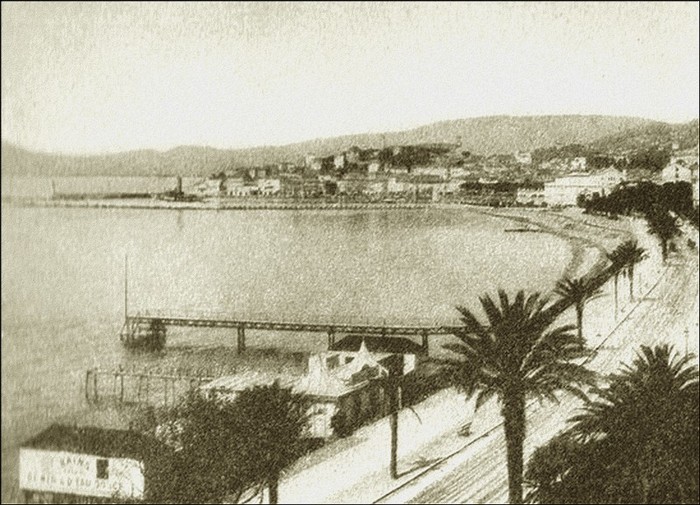
Cannes and its Harbour.
But, to my mind, Cannes is too brilliant, too vivid in its day-by-day life, and too dead when the so-called season has passed, to ever become the El Dorado of the home-seeker. It is more the Mecca of the tired man of the world, seeking a brief holiday amongst his own friends in a gentler climate. Here indeed is everything to make such a holiday perfect. There are excellent golf links, picturesquely situated; the tennis is world famous; the Casino delightfully managed, with an unequalled restaurant, and the gambling is the most spectacular in the whole district. The best-dressed and the most beautiful women of the Riviera are to be seen here, and, in case by any chance they should find their supply of toilettes insufficient, there are branches in the Croisette of nearly every one of the famous dressmakers and milliners whose headquarters are in Paris. Probably in its varied appeal to the world of society and the world of sport, Cannes, which from January until the middle of March is full of vivid and pulsating life, is pre- eminent upon the Riviera. To the ordinary person, however, the Croisette at the fashionable morning hour becomes a little too much like the Rue de la Paix, or Bond Street, and one is inclined to doubt whether it is a real heart-hunger for the sun which has brought this cosmopolitan but aristocratic crowd to frolic in a gentler atmosphere. Yet, for whatever purpose they come, the place is the gayer and the more brilliant for their presence.
In one very important respect, the administrative powers of Cannes seem to have been guilty of a peculiar short-sightedness. They have failed to realise what has been dawning upon every lover of the Riviera for years—that this is not only a land of refuge for a few months from the rigours of a northern climate, but that it is a very delightful resort in the summer months. Farther down the coast, the realisation of this fact has caused an immense change in the local conditions. At Cannes, however, with the commencement of May, the place may be said to go to sleep. The Casino closes, the Carlton draws down its blinds, the Croisette shops put up their shutters, the tennis courts are deserted. Along the whole front you will scarcely see a solitary promenader. The place has suddenly taken to itself the atmosphere of an English country town on a Sunday.
It is an ill wind which blows no one any good, however. Along the coast, only
a few miles away, Juan-les-Pins—in the days when I first knew it a
hamlet of no significance whatever—is rapidly establishing itself as
the centre of summer life upon the Riviera. A wonderful Casino has been
opened there—and I use the word advisedly. Some inspired
person—or group of persons—showed themselves possessed not only
of vision, but had the courage of their convictions, and, instead of building
a casino as an experiment, built one which can compare favourably in
architecture, management and cuisine with any similar establishment
along the coast. As soon as the gaiety at Cannes is over—sometimes even
before then—the place is filled with parties from the villas and hotels
of her more aristocratic neighbour.
There is an open-air terrace, overhanging the sea, upon which it is a sheer delight to lunch or dine, and, later on in the season, the little place becomes reminiscent of Biarritz or St. Jean-de-Luz. Ample and excellent accommodation is provided by the Casino, and the sandy beach is crowded with bathers, lying about taking their sun baths, with no cold winds or grey skies to send them hurrying into a bathing tent, or to rub themselves, shivering, with a great towel, but with a sun the strength of which is always tempered by a slight sea breeze, and which at the end of a month is capable of producing a new race of human beings, tanned and bronzed to an almost unrecognisable extent. From the terrace of the Casino, one can watch all this, or join in, and return afterwards for one's morning apéritif.
At night one can dine and dance in the same surroundings. Last summer, for instance, the popular invitation was to bathe and stay on and dine. People who shrink shivering from the idea at any of our own watering places here enter the water fearlessly. I know a lady in her fifty-ninth year, who has learned to swim within the last season—a confirmed and ardent Englishwoman, but very difficult now to drag away from these warm beaches even during the hottest months of summer.
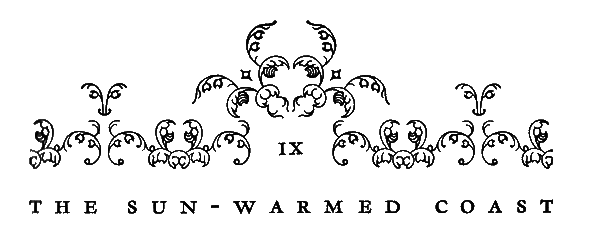
JUAN-LES-PINS, however, is temporarily paying the price of its too great success, of the wonderful vogue which it enjoyed after the opening of its Casino. The speculative builder has marked it for his prey, and it is as though the heavens had opened and let down a torrent of mortar-tubs, scaffolding-poles, cement-blocks and piles of masonry of every description. Villas creep up like mushrooms in the night; the whole town is a bedlam of noisy industry. However many attractions a place may possess, they can scarcely survive an atmosphere of brand-new buildings, the state of continual hammering, the condition of unrest when a whole neighbourhood is thrilled with excitement at the idea of making money with undreamed-of facility. Land speculators haunt the bars of the hotels and Casino, hint at extraordinary bargains, concerning which decisions must be arrived at during the next few hours, whisper of gigantic deals consummated on the previous day. There are stories of plots of land which have changed hands half a dozen times during the week. There is all the fever of easy money-making in the excited atmosphere. Nothing will ever detract from the popularity of Juan-les-Pins as a bathing resort, as long as there is an inch of space left to lie on its brown sands, a yard to turn over in the sea, or a vacant table even in the most retired corner of the Casino terrace, but anyone seeking a home in the place to-day would have to be a man who loved his neighbour's elbows.
One breathes more freely as one traverses the sea road, and, through a still
apparent but decreasing maze of villadom, arrives at the Cap d'Antibes. Here,
a single hotel monopolises one of the most beautiful sites on the whole
Riviera. Its plain, undecorated exterior, with level rows of windows,
presents the appearance of an old French château, and, from its broad
front to the sea, a straight road has been cut through what was once a dense
pine forest. Here, indeed, is a veritable refuge for anyone desiring to
escape from the gayer life of the Riviera, to remain in touch with it and
yet, in the grounds surrounding the hotel and reaching to the sea, to attain
an isolation rare and difficult in this too popular neighbourhood. The genius
of a venerated and happily obstinate hotel proprietor has kept the land
agent, with his almost fabulous offers, entirely at arm's length.
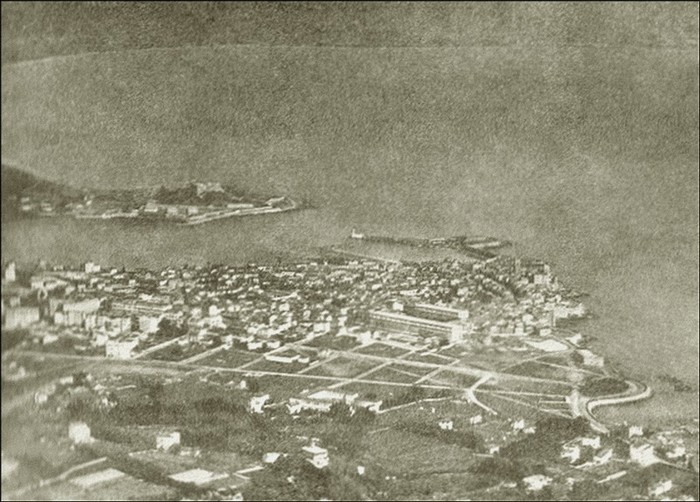
Cannes and its Harbour.
Here is to be found solitude—secluded spots at the fringe of the woods, and the borders of the sea, or farther back amongst the strong-smelling pines, where one can choose one's own little view of the glistening sea. There is no road, or any sort of thoroughfare near, save that one broad avenue from the hotel to the beach. You can attain here all that quietude of environment which is one of the delights of the pilgrim sun-seeker. You can stretch yourself out on a sun-drenched bed of pine needles, give your body to the sunshine, and send your thoughts wandering into the soothing and pleasant places. No one will disturb you. You will hear the murmuring of the sea. You may catch glimpses of a little company of Morris dancers, indulging in their strange antics upon the flat roof of a building overlooking the bay.
Presently, if the fancy takes you, you can plunge yourself into those amazingly blue waters. There are no sands to lie about upon as at Juan or Alassio, and you must take your sun bath, as nearly the whole world here does, on the rocks. The greatest luxury of all is to lie there until the moisture has been dried from your body, and the salt only remains, and then wrap your dressing gown round you, and go back to your quiet place. Any touch of languor has gone. You feel that with the sun and the sea you have helped yourself to the greatest gifts of life, and, with a perfectly healthy human instinct, you have the inspiration to return in some measure these wonderful offerings. It seems that yours is the most pleasant task in the world, as, with pencil and notebook? by your side, you set to work to trap the fancies of your stimulated brain. One feels that before long those woods must go in face of the ceaseless and urgent demand of the land speculator, but whilst they remain we are grateful for them. The name of the hotel—why should I conceal it—is the Hotel Cap d'Antibes, and I take off my hat in respectful homage to its proprietor, who has refused a great fortune for his grounds, and kept them for the solace and enjoyment of his visitors. Some day or other, alas, one feels that conditions will change, but until then there remains the most ideal spot for either summer or winter residence I have ever come across in the course of my wanderings, with a single, but sometimes fatal, drawback—it is not to-day for the man of strictly moderate means!
There are beautiful villas between the Cap and Antibes itself—one
especially, on the edge of the sea, sheltered, retired, with perfect bathing
and outlook, the home, as seems fitting, of a literary man of
distinction—but the most desirable of these are all too firmly held.
One must pass on to the wider spaces, where the land hunger is not yet born,
if we would seek the peace that goes with the sunshine. There are pleasant
spots around Garoupe, but too many people have already realised the fact, and
so, through the old city of Antibes, we come once more to the Route
Nationale. Purposefully, for the moment, we pass through Cagnes, with only a
glance at the ancient town on the hill, and the inviting-looking valleys
beyond. We reach Nice, which I suppose may be called the metropolis of the
Riviera.
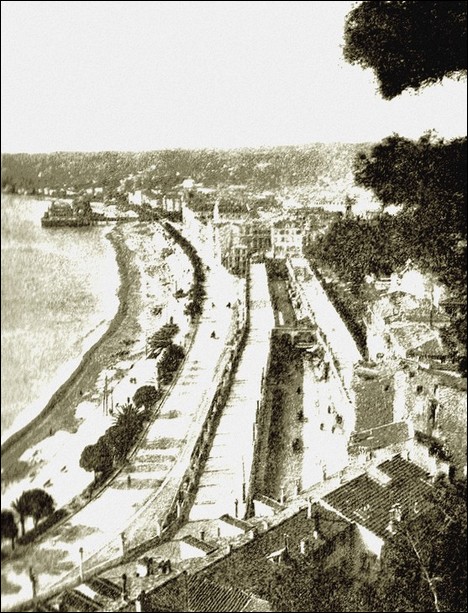
The Port of Nice.
I can give Nice nothing but the Promenade des Anglais, seven miles long, and one of the most famous sea-bordering walks in the world, a wonderful sea, and its full measure of sunshine, very fine hotels, and cheaper shops and markets than either of its neighbours. At the back of the old town is Cimiez, where many people still live contentedly in fine villas and comfortable hotels, and certainly in a very sheltered spot, with a magnificent sea view and complete immunity from the cold winds.
Nice, notwithstanding its size, its population, and its reputation as the El Dorado of the bourgeoisie, is not to be lightly dismissed as a place of residence. It is distinctly a handsome city, with two fine casinos, a very good opera house, many picture-palaces, and excellent shops. There are many of us to whom an urban life by the sea presents many attractions. Nice offers them all. She is the Brighton of the Riviera. She offers cheap living, fine air, plenty of amusements, and a magnificent sea promenade. The Jetée Casino is built like an English pier, over the sea, and you can dine, gamble or dance, with the music of the waves in your ears. There arc Russian restaurants, dancing places, cafés galore of all characters. There is a night life, which I have insufficiently explored, but which my young friends tell me should provide amusement for the most enterprising pleasure-seeker. The gambling here is perhaps more cosmopolitan than at any place along the Riviera. The game is frequently higher even than at Cannes, and one hears sensational stories of immense sums which have sometimes changed hands in a single night. For some reason or other, Nice seems to have become the headquarters of any Eastern potentate who may come this way, and his presence invariably attracts the professional gambler from Cannes or Monte Carlo, or wherever his temporary resting place may be.
As a home for sport, Nice is not to be despised. Her race-course is crowded every Sunday, she has an aerodrome of considerable size, her tennis is thoroughly well- established, and the golf, although it is nine kilometres away, of its kind excellent. As a further tribute to the sporting instincts of the place, I might add the fact that there is no pigeon-shooting!
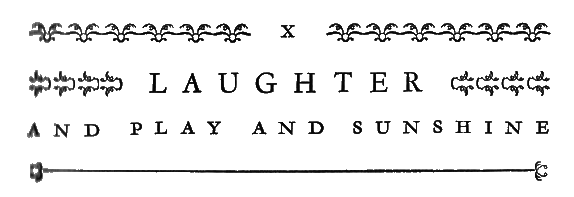
FROM Nice, travelling eastwards, we pass Villefranche, with its magnificent harbour where, from the Corniche road, a dazzling height above, a warship looks like a toy boat in a violet sea, pass also Cap Ferrat, bristling with villas—a very attractive stretch of land, but which we do not seriously consider as a place of habitation, as the villas are all eagerly held, and the hotel is always overflowing. There is land still to be bought—one particular strip overlooking the harbour of Villefranche, with many attractions—but personally I have no fancy for villas built on dizzy promontories which overhang the sea; and the view, beautiful though it may be, would never compensate one for the climb up from the sea-level after the morning's bath.
On the other side of the Cap, which is naturally more exposed, there is some land for sale on the sea level, but this particular little corner has become the Mecca of cheap restaurants. Altogether, to my thinking, Cap Ferrat lacks that reposeful air which is the chief charm of the country westwards, and in a matter of sunshine, the towering background of rocky hills, the last ridge of the Alpes-Maritimes, rather shorten the hours of our delight.
Beaulieu has its attractions, but its intensely English character destroys our sense of being abroad, and its villas are either too magnificent or too unattractive. There is a little harbour, overlooked by an incongruous medley of pink, brown and green houses, and, during four months of the year, one of the best restaurants in the world opens its hospitable gates to the dilettante in food.
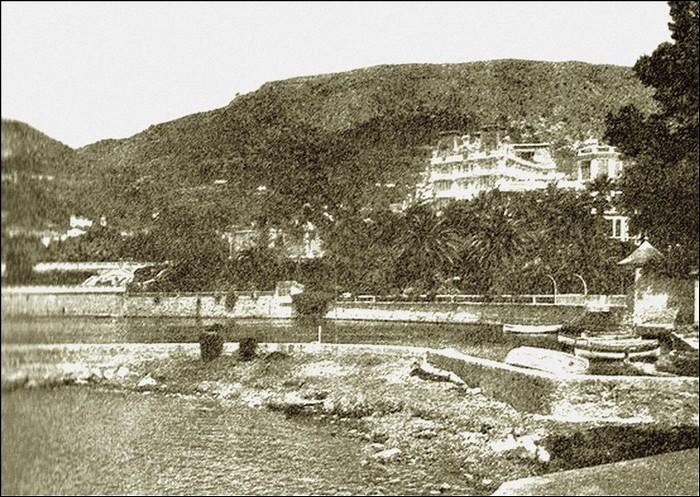
Beaulieu, the Harbour Front.
From a spectacular point of view Èze imposes itself upon the notice of the wanderer along this sun-warmed coast. The old town, built a thousand feet above the sea, precipitous, age- and battle-scarred with the years, occupies a truly commanding position from every angle; but as a dwelling-place, although a few English artists have established a precarious home there, it is scarcely to be seriously considered. There is no drainage, the streets are narrow and impassable for any form of vehicle, and the few inhabitants who toil in the terraced vineyards and olive- plantations near at hand seem more than any other community along the coast to have preserved the Saracenic blood and savagery of their direct ancestry.
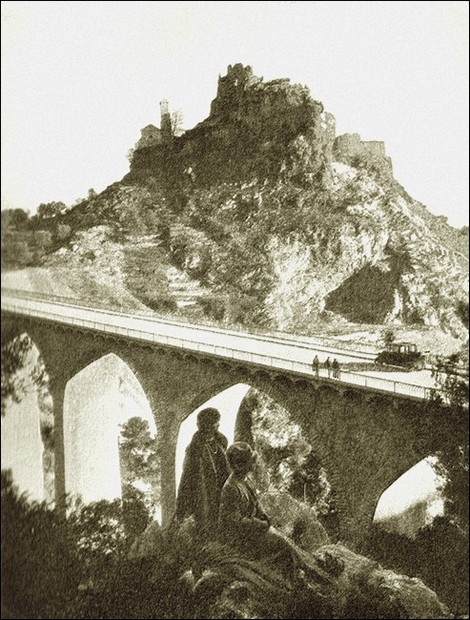
Èze and the Côte d'Azur.
But sheer below, on the sea-bordering road, there is a strip of beautiful and fertile land, with a handful of very attractive villas smothered with flowers. Their gardens are an oasis of colour and perfume at all times of the year. One villa, early in the season, is hidden under its Bougainvilleas; nowhere is there such a wealth of mimosa; roses grow out of the very walls, and, as the summer months advance, the terraces are festooned with ivy geraniums of every shade of pink and scarlet. Unfortunately of land here there is little to be sold—so little that as a place of even temporary habitation it is scarcely to be reckoned with. But those gardens—so rich in colour, in cunningly devised, sheltered corners, in lemon-trees and the rarer flowering shrubs! I sometimes think that the traveller passing by train, within reach of the perfume as well as the vision of all this loveliness, may well believe that this is a little corner of Paradise into which he has made his way. Round the bend in the road is Monte Carlo, with all its pageantry and paganism. But here is beauty!
Cap d'Ail, with its huge hotel and handful of villas, has little more to
offer. The fact is, in these districts, although they comprise the very heart
of the Riviera, the land speculator and builder has had little chance to
pursue his vocation. The seaboard is too narrow, and inland the rocky hills
are too steep to make building operations practicable. I know of no place
between Nice and Monte Carlo which I should recommend to the sun-seeker for a
lengthened sojourn. But Monte Carlo, the most discussed, most belauded, and
most upbraided place upon the Riviera—that is another matter!
Monte Carlo, curiously enough, has a life at which few people guess—an almost domestic life lived by families of English folk, some of whom discovered it as a beauty spot even in the days when olive-trees were growing on the site of the present Casino. The number of residents has increased year by year, and it is an undoubted fact that few people who have once taken up their abode here ever leave—as for instance, one of our most brilliant and popular women authors, whose villa in the heart of the Principality is a happy meeting place for kindred spirits.
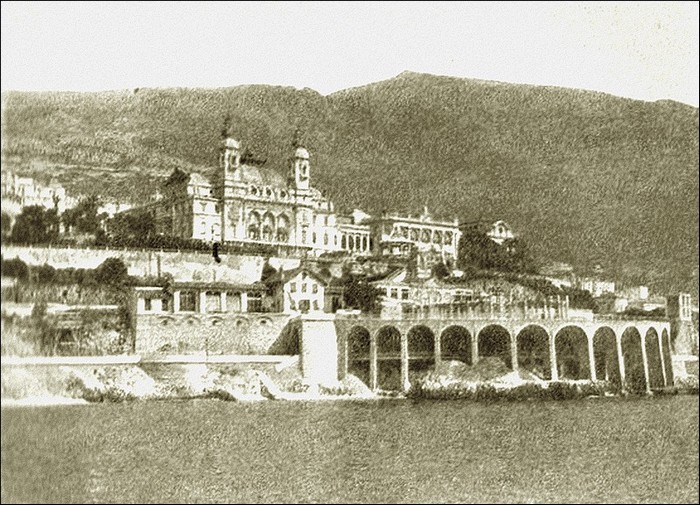
Monte Carlo from the Pier.
For sheer picturesque beauty Monte Carlo easily triumphs over its neighbours. It has every quality which attracts. Its streets are beautifully-kept, its gardens filled always with choice flowers; its restaurants are equal to any in London or Paris; there are two famous tennis clubs, and its golf, although a little sensational in character, is situated amongst surroundings unique in the world. The trouble about every critical appreciation of Monte Carlo— and there arc plenty of them—is that too much is written about the Casino and the gambling, and too little about a very elusive but real atmosphere with which the place is without a doubt endowed, and which makes it one of the most important and in some respects beneficial of the health resorts of the world. Aix-les-Bains, Vichy, Evian, and a score of others, all have their much-advertised baths and cures. What they may do for the tired body, Monte Carlo can often do for the tired mind. For the place does possess that most intangible of gifts, an atmosphere, and if that atmosphere could be subjected to analysis, like the waters of these famous body-curing centres, it would be found to contain the allegorical equivalent to the chemical formula for gaiety.
It is the greatest thing in the world to be light- hearted, and if one thinks of it one can only be really light-hearted with light-hearted people. Turn your back, actually and mentally, upon that stuccoed and minareted pile of architectural absurdity, the Casino, and stroll across to the café. When I was a young man in Paris, they used to say that if you took a seat outside the Café de la Paix in the Boulevard des Italiens, and stayed there long enough, you would encounter every acquaintance you had ever made, even in the most distant corners of the earth. To-day the same thing might be said, with even more truth, of the Café de Paris at Monte Carlo. It is always full at the popular hour, but there is always a table. The ubiquitous little company of strangely clad maîtres d'hôtel, ever watchful and attentive, see to that. Stroll about amongst the crowd as though in search of an acquaintance, and try to find the conventional gambler with his lined face and weary eyes. You won't find him, because he scarcely exists. Try even to pick out a loser, and you will probably fail. You will find men and women, girls and youths, of every nationality, mostly laughing. Such a motley gathering! A sprinkling of the tennis crowd, the men in flannels, tweed coats and white mufflers—good-looking men too, most of them, burned with the stinging breezes of Mont Agel, or the sunshine pouring down on La Festa; Frenchwomen—dangerously attractive—such smiles, such intimate whisperings, such an abandon of mirth when the story is told; family parties too, in soberer groups, flirtatious couples, a sprinkling of camera-slung Americans from the steamer in the bay, taking in their surroundings with that vivid gift of swift appreciation which they have made a national characteristic. And behind, the Gipsy band, bending to their task, which is to preserve their wonderful music and yet let the voluptuous thrill of it sob its way through the babel of voices. Very little drinking—for an intensely sociable place, one drinks less in Monte Carlo than any other place in the world—the lightest of apéritifs, grenadine and orangeades. But the laughter! And why?
The arresting poison of all natural mirth is ugliness. Monte Carlo scarcely knows the meaning of the word. Its buildings are of white—eternally clean it would seem. Its streets are brushed and watered, and its gardens—half Monte Carlo is a garden—tended till the place seems like a doll's domain, of which the parts are taken out day by day, and scoured and polished till every speck of dust has gone, till the pavements shine, the shop windows gleam, and the flowers in their cunningly-shaped beds either lend themselves to the universal blaze of colour for which they were designed, or with the silver guerdon of the watering-can still glistening on their petals exult in their own shy and individual beauty. Then, too, there is something in the way that people walk and carry themselves here. "I am on a holiday," they seem to say. "I like this place. I hope you do too." And before you realise it, your own footsteps fall more lightly upon the pavement, and you are answering them back in the same Volapük of sentiment. What matters if you were dancing At the Carlton till three o'clock in the morning, or if you have lost a few plaques at roulette? Those things don't really amount to anything. What does matter is that you are a happy unit amongst a gentle-mannered little company whose business and pleasure it is to breathe with joy this sun-warmed air, give smile for smile, and thank some fortunate star that there are still days or weeks of holiday left.
You want to test still further the spirit of the people, perhaps the inhabitants themselves. Try one of the shops. It doesn't matter whether you want an out-sized collar, a bone stud or a pearl necklace, your greeting will be the same. You will be made to feel that this particular shop was built that you might enter it upon your more or less ridiculous quest; that Monsieur or Madame had lived through dreary years waiting for the pleasure of this visit of yours, and that if they hadn't the out-sized collar or the bone stud, or if you couldn't afford the pearl necklace, the whole thing had become a tremendous joke, and that their momentary unhappiness at being unable to serve you was more than atoned for by their intense delight at having been privileged to listen to your absurd demand. And, to be serious for a moment, the shopkeepers of Monte Carlo know their business. Just as most of the stories written of the day-by-day tragedies and the reckless gambling of the place are terribly exaggerated, so are all the stories of high prices and general extravagance. You can live in Monte Carlo for considerably less money than you can live in London, and you can buy here all the ordinary luxuries of life, such as Bond Street provides, at a slightly lower cost. Shirts, by- the-by, are cheaper and better.
Make happy one of those smiling, garlic-smelling chauffeurs, who greet you, hat in hand, at every corner, point upwards and mount. Too late in the morning, perhaps, for that most fantastic golf club in the world, where the snow and the sunshine dazzle alternately, and the air bites and uplifts with the savour of dry champagne, so pause when you reach the Corniche and gaze downward. Monte Carlo! Leave out Monaco, and you can cover it with your handkerchief, a miniature and fairylike domain of white buildings and red tiles, blazing gardens and winding roads thronged with men and women moving like gaily-coloured ants in a constant stream. Beyond, the bluest sea in the world, all a-glitter with the sunshine, breaking in gentle ripples round the dark green oases of its spitted "caps." Monte Carlo is gay and good-humoured. Monte Carlo is also beautiful.
But the gambling? I had forgotten the gambling. Enter the Casino, if you will, look round the "Kitchen", and shudder. Here is the plague spot of the place, the refuge of the system-player and the unhappy parasite who clings to the hidden spot of all beautiful things. Scarcely worth considering, though. A few scores or hundreds of crazed people who have lost their touch on life and all things worth while,—what do they count for against the happy crowds outside? Hurry through to the Salles Privées, the smug resort of the bourgeois player, a solemn spot, I grant you, and as dreary as you like. But it is not here that you find any part of the real spirit of Monte Carlo.
Collect it again, if you will, and gamble gaily when you have changed and cocktailed and dined in the Sporting Club, the only place where you can lose your money light-heartedly and meet your friends of the tennis courts, the golf course, the famous Royalty bar on the hill; your friends from London, from Paris, from the "shires", from Washington, from New York. There is as much laughter here as play, as many cheerful parties in the bar as around the tables, quite as much flirting as serious gambling. For "Madame" is the presiding spirit of the place; Madame, who, with all her graceful votaries, is here in spirit and in person for the pleasure of your vision. For you—here—she wears her most beautiful toilettes, her most dazzling jewels, the smiles which typify the sunshine of the place. You may gamble, if you will; you may watch the great puppet-show; you may join one of those cheerful groups at the bar; you may even, if you have the inclination, find a seat on one of those cushioned couches and bandy light words with Madame of the moment till you pass through the portals of initiation to the gardens of flirtation.
The Rooms are crowded, and you have lost your plaque or two. You pass outside to the cool blue twilight, and stand upon the steps waiting for your voiture. Opposite are the fantastic lanterns of the harbour—a little redder and greener than any others in the world—the twinkling lights from the headland, and from the yachts below. The music calls you from the hill, the witchery of the Blues, the strains of that haunting waltz. The fingers of Madame tighten upon your arm.
"I think we dance," she whispers.
And you dance.
So, after all, in my mind, Monte Carlo must take its place as a possible El
Dorado of the sun-seeker, always with two grave and stern provisos. The
first, that he has no serious work to do in life; the second that he is free
from any positive predilection towards gambling. To risk a few louis,
or even a handful of plaques, whilst moving about and encountering one's
friends, is an agreeable change of recreation, but to sit down hour after
hour, day after day, trying to work out some impossible system, or watching
with strained eyes the turning of that wheel of fortune, is a pitiful misuse
of one's time and money. To me, personally, Monte Carlo is one of the most
attractive pleasure spots in the world; as a place of permanent habitation,
notwithstanding its sunshine, its joyousness, its pleasant society, it would
be impossible. But that is because I am a worker.
And to return to the entirely practical point of view, always necessary when one is thinking of a long sojourn in a foreign country, there are hotels in Monte Carlo, astonishing though it may seem, where you may live in comfort, almost in luxury, at an amazingly moderate price. Of course all the well-known hotels on the hillside and gathered round the Casino have their own scale of charges, and, for people of modest tastes, are best avoided, but down in the Condamine, and up towards Beau Soleil, are some excellent smaller caravanserai where, when the franc was at a hundred and fifty, good accommodation was to be found at between thirty-five and fifty francs a day. I actually lunched, a few months ago, with a friend who was paying forty francs a day, including baths, shared his table d'hôte luncheon, and preferred it to the more elaborate meals at the restaurants de luxe. But then—and this is one point which will always make living in France cheaper than living in our own country—the Frenchman understands the art of moderate-priced eating. As a rule, the small hotel proprietor does his own marketing, knows exactly what to buy and what he can afford to pay for it, and very seldom indeed does he come home empty-handed. The vin du pays is, of course, ridiculously cheap. Coffee is always an extra, but then one may perhaps permit oneself a single luxury.
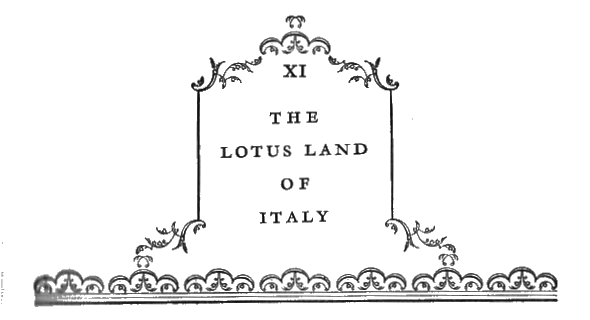
THE features of Mentone which I have always admired most are its ivy geraniums, hanging from the walls of the villas on the Italian side in marvellous profusion and variety of colouring, and its sheltered situation. It has an excellent promenade, two very attractive hays, a famous bridge club and has somehow or other become a favourite spot amongst a certain class of quiet-living, elderly Englishfolk. There is a casino, and there are amusements, but the residents and habitués of the place arc of a sedate turn of mind, bent apparently, if one may judge from the number of bath- chairs upon the promenade and the early hours of the place, upon prolonging their span of life in every possible manner.
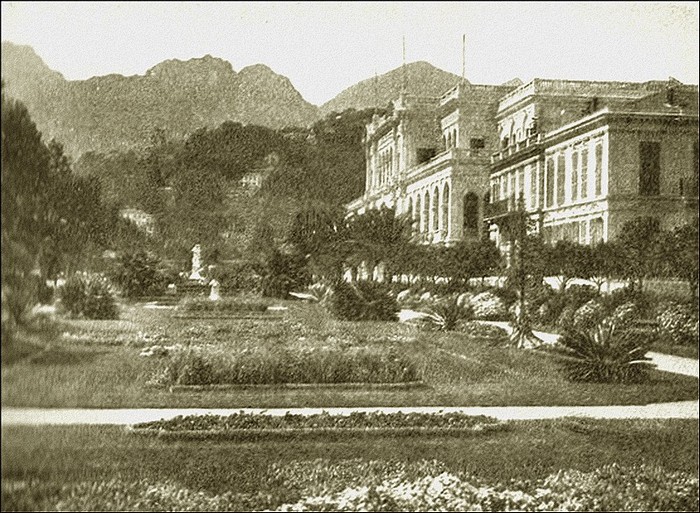
Mentone, the Gardens and the Casino.
There are some beautiful villas and some wonderful gardens, but the social life is much enclosed, and the average age of those who have made it their home is probably higher than in any other resort upon the Riviera. There is a very beautiful valley stretching from the back of the town to the foot of the sheltering hills, where some of the villas are of more imaginative character, where the sunshine is frequent, and the soil favourable to flower cultivation, but the atmosphere of Mentone is a little flat and enervating, and certainly less bracing than that of the nearby Principality. People live here, however, in great content, and to a great age, but the place always seems to me to be a kind of lotus-land of English libraries, Scotch tearooms, and the retired and decrepit portion of the British Church and Army.
The Italian Riviera, without a doubt, possesses a charm which eludes the
casual visitor, for all through the year an increasing number of English
people are taking up their residence there. Without in any way, however,
desiring to disturb the sentiments which inspired the Peace of Locarno, it is
somewhat a shock to find oneself continually in touch with a very strong
German element. At San Remo, for instance, the street and hotel notices are
once more printed in German as well as in English and Italian, and one hears
on every side the guttural, strident notes of the language with which we have
become happily unfamiliar. San Remo has a casino which is sometimes open and
sometimes closed, according apparently to the state of Mussolini's liver or
conscience. It has tennis courts, an attractive promenade, rather spoilt by
the proximity of the railway, a moderately sheltered position, and an old
fifteenth-century town in the background, a vivid contrast in picturesqueness
and squalor, almost as odoriferous as the alleys behind the bazaars at
Constantinople. It is hard to realise San Remo, however, as a possible place
of residence. It has its meed of sunshine, but, wandering about the place, I
find myself in search of some pleasant spot in which to enjoy it. The villas
are some of them handsome enough, but they arc unfortunately reminiscent of
the villas outside any large and prosperous town. The streets are clean and
well-kept, the shops not without attraction, the hotels—one or two of
them at any rate—almost palatial. Nevertheless, I must confess that I
find San Remo dull.
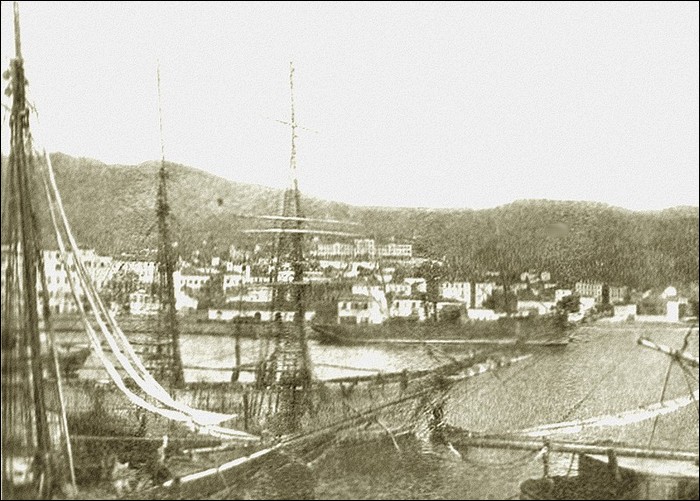
San Remo from the Harbour.
It is about here, too, and farther eastwards, that one realises how much the picturesqueness of these various centres suffers from the barer and bleaker background, the stonier hills, the sparser vegetation of the whole countryside. Of pasture-land there is none, and the very vines seem to force their way through an unwilling and churlish soil. The flowers alone, with their brilliant patches of colour, present a redeeming feature. There are strips of carnations on the very edge of the cliffs, and, here and there, as the road winds into the more sheltered places inland, entire fields of them, a little scentless, but a relief, at any rate, to the eye. Farther on, along that tortuous road which leads to Genoa, utilitarianism takes a disfiguring hand in the business of collecting impressions, in the shape of factory chimneys with their attendant eyesores.
Porto Mauritzo is a thriving town, doing an immense trade in oil, which I hope tastes better than it smells. At Ospedaletti one seems to breathe a more pleasing atmosphere. Here too there is a kinder background, a more smiling air about the few villas and prosperous-looking hotels, and a general impression of cleanliness and hospitality. Again, however, the sea frontage is spoilt by the railway—a passable barrier no doubt, but disturbing to one's illogical sense of the picturesque.
Of Bordighera I have nothing to say, lest some day I should meet someone who liked Bordighera, and there might be trouble between us. But at Alassio, I, for the first time, in this part of the world, found charm. The ubiquitous railroad has made its way inland where it belongs, and the place possesses a quaint waterfront, with an amazing variety of architecture—if "architecture" is not too pretentious a word—weather-stained pink houses with green shutters, green houses with pink shutters, houses of every size and colour and degree of shabbiness, yet somehow or other harmonised by time and soft air into an incongruous but pleasing outline. Climatically and for its own sake, I prefer Alassio to any of its neighbours. It has a wonderful stretch of sand, and the sea-bathing is safe and good. It is very proud of its meteorological records, which I have not studied, but one feels that this is a place of sunshine; one is conscious of its lingering influence even when for a few hours it fails.
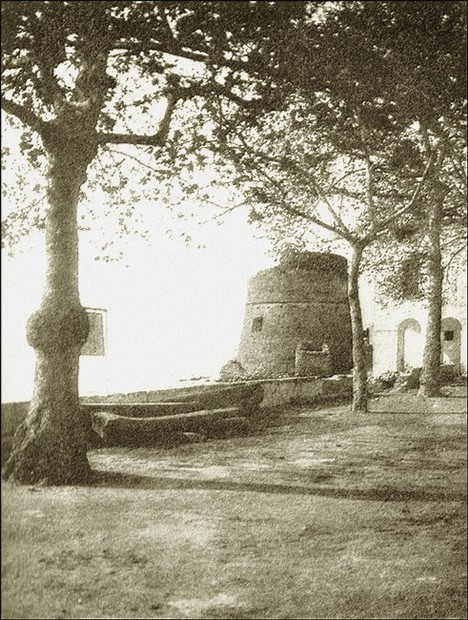
Old Fort, Alassio.
In a sheltered corner of the beach, on the sands in front of their clinic, are a little colony of earnest sun-seekers, who spend the day in dug-outs, or having sand-baths, or disporting themselves in the sea. They are as brown and healthy-looking a lot of invalids as I have ever seen, and whatever their maladies may be I should say that they have found the cure for them. I was offered on my last visit there the courtesy of a sand-bath by the medical superintendent, and the idea is certainly appealing—sand, soft and fine and sun-dried, up to your neck, and then as much sunshine as your head can stand. Afterwards a shake and a plunge into the sea. Next time I meet a friend who is suffering from rheumatism or any of its first cousins, I shall tell him to leave all other watering places alone, and write to Doctor Barton at the Villa Iris.
Alassio, apart from its meed of warm sea and sunshine, possesses various other appealing qualities to the wanderer in search of a temporary residence, and though I should be loath myself to pass that troublesome frontier, she is not to be ignored as a place of abode. She has not only a picturesque sea-front, but a background which is almost like an oasis, trees in unexpected profusion and variety, lemon trees, cypresses, eucalyptus trees, besides the customary palm and olive, so that if one passes along the Viale Hanbury when the evening breeze comes down from the hills, there are sometimes delicious little wafts of perfume which make one long to explore that very inviting-looking country behind. The villas are well placed, tucked away in wonderful corners, and not too ostentatious. The Casino I know nothing about, but it appears insignificant, and I imagine it panders only to the minor frivolities of life. The main street possesses the usual attraction of so many Italian towns. It is paved and narrow, and intended for pedestrian traffic only. The shops are interesting and sufficient. The "antichità" stores seem a little overcrowded with stock, and just a trifle reminiscent of borderland bazaars, but there are nearly always one or two decent pieces of Italian furniture to be picked up, if one has a taste that way. There is an excellent English Club in the place, good tennis courts, an exceptional English library, and at least one first-class café. Of night life, if there is any, I know nothing, but if you wander down that main street towards its mysterious and ill-lighted end, where the dark alleys open up on each side, and the bats come flying out in startling silence, you may sometimes hear from behind a tightly drawn blind the twang of a guitar, sometimes see the shadow of human figures moving to the dance. It may be that there is gaiety within.
If my inclinations drew me towards Italy for my feast of sunshine, I should choose Alassio.

I AM at loggerheads with the world about Naples. I have visited it some dozen times, but never lately without a mackintosh and umbrella for one eventuality, and a pair of sun glasses to keep the white dust from my eyes for the other. There are handsome shops here, where one can buy tortoise-shell trifles at a little less than anywhere else, at least two very fine hotels, and picturesque streets along which one can wander and imbibe impressions of Neapolitan life. As a place of residence it is not in the running at all. Its immediate outskirts are ugly and squalid, and its background, with the whole crater of Vesuvius, is arresting. Its greatest charm to me is that from here Sorrento and Capri can be reached by steamer.
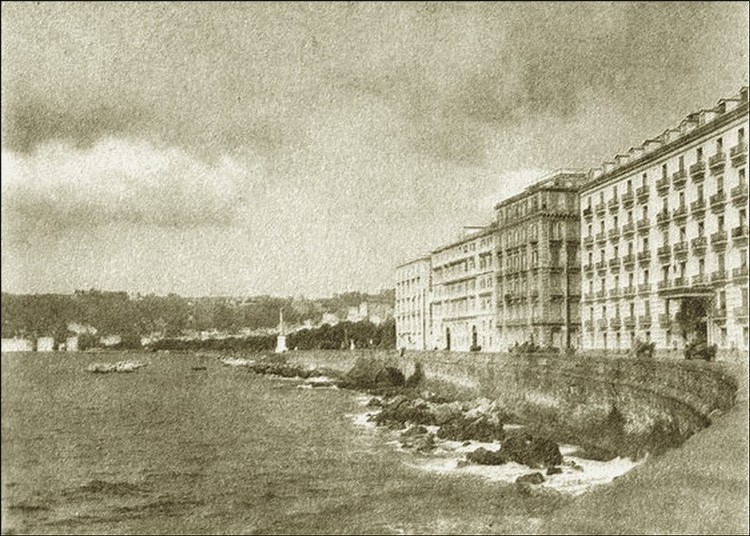
Naples and the Bay.
Sorrento, with its matchless situation at the base and younger slopes of the sheltering mountains, seems from the sea to be a fairy city of gardens. The window eyes of its strangely-built villas gaze serenely across upon the Bay of Naples. She seems somehow to be mocking, with that little Neapolitan lilt in her voice, the great city across the blue bay, with its bleak, exposed streets and windy squares. She gathers sunlight as the earth soaks in the morning dew. Her terraced gardens are from near seawards a wonder of colouring, her oranges are the first to hang heavily upon the stalk. Sorrento attracts the sun-seekers of many nationalities, because of that wonderful view, which the great American novelist who made it his habitation after years of wandering, pronounced the most beautiful in the world; because, too, of its sheltered corners amongst the hills, where cold winds are unknown and the most exotic flowers and shrubs blossom as though in a conservatory. Sorrento has a pleasantly languorous atmosphere of its own, soothing to the tired man, but containing something of the enervating influence of the lotus flower to the loiterer whose days of work are not yet over. She has some excellent hotels, some picturesque villas, mostly occupied by Italians or Americans, and, except on days when the west wind blows, the air is so quiescent and motionless that it becomes saturated with the perfume of the flowers which hang from every wall. She is a city of sweet scents and sunshine and lovers; the Circe of resting places, in whose embrace one might drift swiftly enough into the poisoned sleep. Here one might find happy harbourage for a tired life, but the wanderer whose work in the world is as yet unfinished, and whose brain is still alert, should seek an atmosphere less soporific.

THE sun-seeker, as a rule, has some other wish coupled with his desire to enjoy the greatest gift of nature, a wish governed, naturally enough, by his tastes and inclinations and the course of life which he pursues. If it should be sport and high gambling at baccarat or chemin-de-fer which appeals to him, then he will probably choose to bask in the sunshine of Cannes. If his devotion to sport is less strenuous, if roulette should be his fancy and music amongst his pleasures, then he will probably decide upon Monte Carlo. If he should still hanker after the life of a busy city, more popular music, the daily promenade and the evening cinema, he will be content with the sunshine of the Promenade des Anglais at Nice. But if his joy should be to find his way into beautiful places, to breathe an altogether kinder atmosphere, and to live at such time as it pleases him with his head in the clouds, then there are many of the lesser-known resorts upon the Riviera where he can find content.
Amongst the better known of these is Grasse, with its perfume factories, its historical associations—no word concerning which have I any desire to inflict upon you—and its charm of flowers. As the spring season progresses, the town, with its wonderful rampart and ancient court-house, becomes a sacrificial altar upon which the whole glory of the countryside is offered to the Gods of Commerce. Along the main road and down every byway from the mountains, you meet the brown-faced peasants, the baskets upon their crazy carts heaped with violets, jessamine, daffodils, roses, carnations and all the sweet-smelling wild flowers in the valleys between the hills above. Wherever one turns there are little wafts of perfume, intoxicating at first, yet in time creating a slight revulsion of the senses. There is something akin to butchery in the sight of those closely- piled baskets. One wonders whether there is not more real sweetness in the faint odour of the meadow flowers by the stream at Hyères, or from the sun-dried wild thyme in the ruined theatre of Taormina. About the whole of Grasse, beautiful though the old town is, wonderful though the panorama spread out under its ramparts, the plains stretching to Cannes and the sea, there is still a faint sense of something not wholly satisfying. Sunshine is there in plenty, as its wealth of flowers proves, but there are villas, a large hotel, char-a-bancs filled with tourists at all seasons of the year, a tall, disfiguring chimney to mark the final butchering place of those massacred flowers. A very pleasant resting-place for a week or a month, but I fancy somehow that the sun-seeker who has turned his back upon the overcrowded places would prefer to go a little farther afield in his fascinating quest.
Along the mountain road, climbing a little higher into the hills which guard the great playground of the world below from the northerly and easterly winds, lies Vence. Vence itself is not in these days a place of any particular beauty. The old market-square is spacious and interesting, its narrow streets have character, but there arc many of the ancient hill villages inland towards Sisteron and Digne, preserving a more perfect architectural unity and more picturesque in themselves. Yet Vence has charm. Artists set up their easels there, and apparently do well, for they build villas, and import velveteen clothes from Paris. Some part of their inspiration may come from the flashes of unexpected colour which are all the time surprising one. In the centre of the town, through a crumbling archway upon which is emblazoned a coat of arms, faded and worn with age, one gets a sudden bewildering vista of Bougainvillea, rich in its full, sweet purple, mingled with clustering bowers of mimosa, the two clinging round the remains of an old fifteenth-century house, whose grey stone walls, over three feet thick, are still defying time. Sheer beyond is space, and below vineyards, sloping to one of the rich plains that creep into the hollow of the hill. Outside the town southwards one is conscious of the slight slur of villadom, tempered, however, with a sense of the fitness of things, and the unobtrusiveness of these, for the most part, singularly unostentatious dwellings.
For to live here, in this my chosen neighbourhood, in the shadow of the mountains, amongst the flowers and with that very beautiful plain of vineyards and olive-trees and orchards rolling away seaward, one must have a roof over one's head, and, after the first shock, there is something a little pleasing in those pink and white and green maisonnettes, each with its formal strip of garden, already ablaze with flowers. The very smallness of them pleases. There is nothing pretentious in their architecture, and their slightly bizarre outline and colouring never offend the eye. They arc, after all, not out of character with their setting,—a type of scenery, beautiful and satisfying, yet not without its faint note of artificiality. Vence is a good place. The sun shines graciously here, its oranges are golden, and its wine excellent.
One can live cheaply too. There is an adequate hotel of purely French type, and a surprising number of pensions, several of them with beautiful gardens. If one is content with the simple fare offered, the rates are amazingly low. Vence is not a greedy place.
For the lover of peace as well as of sunshine there exists an almost
undisturbed El Dorado in these valleys and hillsides which roll down to the
sea from Grasse, Vence, St. Jeannct, Gourdon and La Gaude. The hill villages
in this district, all of course Italian in architecture and type, are
primitive in the extreme, devoid of interest to the archaeologist, yet with
an almost indescribable charm of setting and character. Most of them are
built on an eminence towering above the winding main road, and are reached by
a precipitous byway which loses itself somewhere in a tangled maze of ancient
buildings and passages, never to reappear.
At La Gaude there is a rude terrace upon entering the village which overlooks the valley and from which one can gaze upon a land fruitful in vines, rich pasture-land, orange- and lemon-groves, all protected from the north winds by the mountains behind. Here are fairy sites for many homes, in the sheltered places and long swelling valleys, where the sunshine seems to linger almost incredibly, as the brown faces of the peasants testify. And there is a beauty here which one does not as a rule associate with the Riviera—a beauty of soft verdure, of gentle outline, of colouring, perhaps not so vivid as farther eastwards, but more restful and longer enduring.
Just below the rampart wall, the women of the village have climbed the trim orange-trees and arc dropping the blossoms into great baskets underneath, baskets which you may meet at any time piled on a peasant's cart en route for the butchery of Grasse. There is something a little forlorn in the stripping of the trees, and the absence later of any promise of fruit, but no one knows better than the French peasant where profit lies, and the oranges when they come are barely worth carting around. There is a grove of lemon-trees too, not fifty yards farther down, profitable enough in the rearing, and with indications already of a goodly harvest.
Just below the main road is a meadow almost English in appearance, with a trout stream tumbling downwards, and an old Italian farmhouse facing south. Here you might joyfully build the fairy resting place of which you are in search—a pink villa with overhanging flat roof, and a long piazza sweeping around to catch the sunlight at every angle, from which you can look down at the blue Mediterranean and watch your crops ripen. There is a vineyard on each side, and between the vines rows of trimly-planted peas. On the pasture—rare sight in these parts—several cows are grazing, and below, the orange- and lemon-groves, a cherry- orchard, the fruit already red and luscious, and olive-trees in abundance. There it also a tiny wheat field, but, as you follow the road down to San Paul and reach the softer air of the lower valley, you come to the rose-orchards mingled with the vineyards, long patches of crimson, red and white, sometimes so close to the vines that their leaves are intermingled.
With ordinary care the peasant farmer can reap several harvests of these blossoms during the season, all, alas, to go the way of the orange flowers, but in the spring a joy to look upon, and with a perfume indescribably sweet when the slight Mediterranean breezes stir inland and shake the bushes.
Curiously enough, although the building of villas has become almost a disease in the more formal parts of the Riviera, here the whole valley, with the enclosing hillsides, has been left undisturbed. There is no sign anywhere of a modern building, save the tin shed over the village washing-place. It is only when one descends past San Paul to its neighbouring hill town of Cagnes that one comes across the habitations of any other save these dwellers upon the soil. Yet what a paradise lies behind for the sun-seeker who loves also the still places!
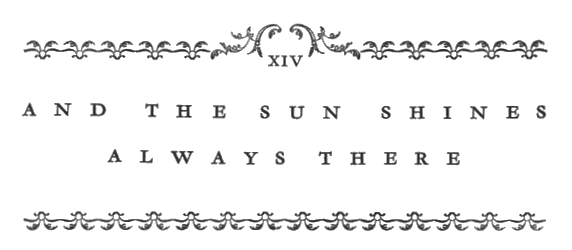
THE old city of Cagnes is a veritable hill town, almost like a miniature Perugia, overlooking the last stretch of sunlit plain which borders the Mediterranean. It suffers a little from its propinquity to San Paul, where many of the older houses in every stage of decay possess still some details to remind us that they were once palaces. Cagnes, although the beauty of its situation and its dominant views have brought a little colony of artists to live on its heights, in those quaintly converted houses, is, for all its external picturesqueness, a trifle squalid. There is warmth and sweetness of colour here, and entrancing views of the Mediterranean below, but the town itself, in comparison with many of its smaller neighbours, somehow disappoints in atmosphere as well as in detail. One fancies that a portion of the warlike spirit of its inhabitants of centuries ago— the men of Cagnes since the time of the Saracens have always been fighters—remains still in the frowning faces of these present-day inhabitants. They lack the frankness of the thoroughly Provençal French peasant. There is something furtive about the way they pass up and down the cobbled precipice they call a road, or in and out of their mysterious, squalid-looking houses. Nevertheless, those closed doors reveal at times secrets. There are English and American writers as well as their brethren of the brush who have made a temporary home here in the quaint-looking but fascinating little dwelling places into which they have transformed some of the old houses. The castle, never imposing except for its situation, has been stripped of its treasures. The church is bare and forbidding. There remain very few traces of a splendour which, according to ecclesiastical records, was always a little severe.
But below, a mile or so away, beyond that strip of lower town which fringes the main road, and which possesses no single feature of attractiveness, is an oasis of an entirely different character. Here is a broad expanse of grassy meadowland bordering the Mediterranean, studded with olive- trees of incredible age, disfigured, alas, here and there, by sanded scars and the ugliest clubhouse ever reared by the hands of man for the accommodation of his fellows, but still a pleasant open space, from remote corners of which are many fine views of the snow mountains in the background, and across which there flickers on the hottest day a kindly breeze from the bordering sea. There are golfers here in plenty, it is true, to disturb the tranquillity of the place, but the season is only for six short months, and afterwards the town is deserted. It is then its whole character seems to change.
There are buttercups and daisies, and even cowslips in the long grass; birds in—for the Riviera—an amazing variety: chaffinches which sing all day, and nightingales in the pine-grove by the sea, breaking the stillness of the night.
Harmless snakes creep out from the tree roots, lizards lie motionless upon the walls, and the gorgeous June sunshine, too little known by the occasional Riviera visitor, comes to bring a glitter to the sea, to draw a perfume from the roses, to waken the love of life in us if we are tired, or to soothe us to languorous forgetfulness if that should be our mood.
With the passing of the tourist season comes a peace and tranquillity to this little corner of the world which is like a new elixir of life. One wakes to the song of the birds, and the slow music of the sea; one dozes to the monotonous but tuneful chorus of the frogs, the first notes of the nightingale, the incessant washing of the tideless sea on the shingly beach. There is many a sunny day in England during May and June, but here, as the season advances, the sunshine becomes inevitable. Morning after morning you can tell the hour by that streak upon the carpet, take your early coffee on your balcony with roses drooping round you, bask and live in it until you are driven by its heat to the shade of your olive-trees, to come out again when the night breeze whispers its way through the pines, rustles across the golden-starred meadowland, and shakes your own olive-leaves with a murmur as of pattering rain. Then you may roll up the awning on your balcony, and dine to the music of the coming night, in the clear, sweet silence, with the day's warmth still lingering in the air.
Flowers in the garden, as the season progresses, you may begin to lack, but think of what the passing months have brought you—the great wall of drooping wistaria, wistaria and roses twining amongst your old olive-trees, roses wherever you have found space to plant them, carnations and mignonette, gaudy nasturtiums, one wall of glorious Bougainvillea, borders of stocks, and, against the side of the house, those great plants of sweet-smelling heliotrope. You dine in the blue twilight, watch the fireflies dart out, and listen to the shriller chirp of the huge grasshopper—a curiously treble note against that insistent, throaty call of the frogs—sit there until the moths begin to buzz about your hanging light, and that second breath of night wind comes up from the sea. You know then that it is time to find your way indoors; but all through the day you have had your meed of sunshine.

THE seeker after sunshine who is an habitual tourist by inclination, gregarious by taste, and perhaps unwilling to go to the trouble of speaking a foreign language, needs no assistance with regard to the practical details of his quest. Almost every place mentioned in these sketchy notes has its hotel or pension, information concerning which can easily be obtained by writing to the agents. One might, however, offer a word of advice to those who wander out here, possibly with work, possibly with a chosen companion, a person of simple tastes to whom a casino or casino life presents scant attractions, who would rather avoid than seek a crowded dining-room, and the conventional hotel lounge, with its array of bridge tables. If that person chooses to take a little trouble, there are many of the more remote places, where paradise may be tasted. The smallest and most unassuming hotels in that strip of the Riviera from Beauvallon, say to Nice, are sometimes amazingly and unexpectedly good—hotels where a score of guests is about the limit that the place can accommodate, where the host cooks the dinner, Mademoiselle serves it, and Madame supervises.
Tucked away out of sight and hearing of the pleasure tumult of the Riviera proper, but still within easy reach of the various centres, are many of these places where one may be sure of a clean and good bed—the beds in this country are wonderful—an omelette, which I still consider the national dish of France, freshwater fish when in season— there are trout streams everywhere—veal, for some reason infinitely more tender than our own, vegetables cooked with peculiar skill, excellent cheese, and a bottle of country wine. I had such a meal myself only a few days ago at that fascinating old town village, San Paul, served on a rough balcony, my hastily knocked together wooden table covered with a spotless though torn cloth, a vision of rose-orchards and vineyards falling away southwards, the glitter of the Mediterranean beyond, and sunshine from which one was sometimes forced to seek shelter by leaning back into the shade of an olive-tree. The bill worked out at something like two and four-pence for each person, including liqueurs and coffee, and for the neighbourhood the restaurant was considered expensive! If I had been staying in the small hotel attached, en pension, it would have cost me even less.
The cost of living is subject a little to the vagaries of the franc, but on the whole it is very much less than in England. A bottle of any of the well-known brands of whisky can be bought for forty francs—at to-day's rate of exchange about five and sixpence—but served at a restaurant a whisky and soda would be dearer than the vin du pays. The latter, however, even if drunk with a little mineral water, is a far more suitable drink for the climate, and if some of the country wines grown in the vineyards round St. Jeannet could bear transport to England, the custom of drinking spirits with our meals would soon, I think, die out altogether. The French beer is excellent—the Monaco beer is, I consider, the best in the world, but it is more expensive than the wine. The supply of fish and vegetables is about the same as with us, but the latter are at least a month ahead of our seasons, and there is always so much market-gardening that they are considerably more plentiful.
The domestic-service problem scarcely exists—at any rate upon the French Riviera. The inhabitants are naturally of mixed French and Italian race, and instead of having predispositions against domestic service—-which predispositions seem to be on the increase in England—they look upon it as being the easiest and pleasantest way of making a living. The matter of dignity—rather a spurious consideration at any time—does not enter at all into their calculations. They make excellent servants in their way—the men especially—but they arc not so hard working as English people, of a similar class, and the women do not present so smart an appearance. The usual combination for a small household is a man and his wife, and their united wages come to less than you would pay a single manservant in England.
The exchange is, of course, a factor seriously to be considered. In the luxury establishments of the well-known centres, such as Cannes, Monte Carlo, and even Nice, prices are manipulated almost day by day, particularly against a foreigner. In the country districts, however, and in such large establishments as the Galeries Lafayette in Nice, for instance, where every thing is marked, discrimination is impossible, and with a little care it is easy to gain an advantage in one's purchases, to which one naturally feels entitled.
I have come to the conclusion, however, that the very large English community settled in the district, reaching from St. Raphael to Monte Carlo, is not greedy in this matter. It has been a generous donor to the fund raised locally for the improvement of the franc, and such English bank managers as I have come across out here always rather discourage the day-by-day efforts of some of their clients to gain a little on the exchange. Naturally it is profitable to live out here at the moment, because however anxious the shopkeepers and farmers may be to raise the price of their wares as the franc drops, they are never able to do it to the full extent. There is always a margin of profit, and a resident who is known to have contributed generously, according to his or her means, to the Relèvement du Franc is fairly enough treated.
One has the pleasure out here, too, of living amongst a contented and happy people. National finance no one seems to know very much about, nor is the subject often discussed, but we do know that our tradespeople, builders, workers in the fields, operatives of every sort, arc more prosperous than they have been for many years. Fête days—and from the point of view of convenience, there are too many of these—are indeed a gala sight. The French girl has money to spend upon her clothes, and she docs it to advantage. The Frenchman, however, spends little upon his pleasures—a vermouth and cassis lasts him for at least an hour, and costs him less than a glass of beer. One wonders sometimes how the cafés earn a profit, but, as a matter of fact, they are not so prosperous as the corresponding inn or public house of England. Drunkenness out here is an amazingly rare occurrence, even during the celebration of a national holiday, yet there are no restrictions to the sale of wines or spirits, no tyrannous hours to which one has to conform.
In arriving at any definite conclusions as to the great or small things of life, reason and argument are, of course, our first resorts, but it becomes also a necessity to rely to a great extent upon our impressions. One is conscious of the fact that in this atmosphere the day-by-day life is a more gracious and simpler affair than in Anglo-Saxon countries. Perhaps that national politeness, gentleness of speech, of physical and even mental carriage, which I no longer consider as a veneer, amongst the people whom one meets throughout the day, ministers somewhat to that impression. Then the press are not forever confronting their readers with gloomy problems. Taxation is mercifully slight and leniently administered. Life in its instant state seems to be the great matter of import, and that it should be gay and free from overmuch responsibility appears to be the will of the people, evidenced alike in their courage, their good humour, their unclouded faces and their optimism. The whole world which moves around them seems to draw down into it a little of that sunlight which is the almost daily portion of their lives. The Anglo-Saxon is by predisposition a brooder. The Latin races seem to pass on their joyous way through life with a whistle upon their lips, and a smile upon their faces.
For example, your automobile breaks down, and you send, in fear and trembling, for a mechanic. He examines the damage. His manner is sympathetic but not gloomy. It is a misfortune, perhaps, which has arrived, but one which can easily be remedied. It is even, perhaps, for the best. Had it not happened at this moment, a more serious accident might have brought harm to Monsieur and his friends. A matter of a few days, a little trouble, a small expense, and Monsieur will find his car better than ever. All this with a smile, without in the least altering the facts, yet somehow spoken in a spirit of infectious optimism. And so it is through all the ordinary troubles and annoyances of life. "C'est un petit malheur qui arrive." Nothing but the death of a friend or relative seems greatly to distress this light-hearted but hard-working race.
At a funeral, however, they have the habit of transforming themselves into pictures of woe. The mourning attire of the women is far more complete and sombre than anything to be met with at home, and it is always the bounden duty of relatives from far and near, friends and even acquaintances, to render the last tribute of respect to a passing soul. When one sees how the death of even a slightly known person affects these people, and what their sense of responsibility is with regard to it, one can understand more than ever how terrible and heart-rending must have seemed to them the slaughters of the War.
One should perhaps indulge in a modified word of warning as to the weather to be expected even in these chosen places during the first three months of the year. I have come to the conclusion, after a good deal of wandering, that the only place one can expect inevitable sunshine during these months is in the tropics, where very few of us, I imagine, would care to take up anything approaching a permanent abode. November and December in these sheltered corners of the French Riviera arc delightful months, with practically unvarying sunshine, and a peculiar geniality of atmosphere. Last Christmas Day, for instance, I lunched on the balcony of my villa at Cagnes, and was obliged reluctantly to let down the awning to avoid the heat. During January and February, and generally in March, however, there are rainy days, and occasionally sunless ones. The mistral—as the wind from the mountains is called—is a most disagreeable visitant, and sometimes lasts for two or three days. The sirocco, coming from the sea, is warmer and more humid, but none the less disagreeable.
The great point to be considered, however, is that these are interludes. Weeks of uninterrupted sunshine are quite common during these months, and when a bad spell arrives it is less severe than in any other part of the world to which we are accustomed. There are frosts here, even in March, but of far less severity than at home, and snow in the immediate neighbourhood I have only once seen. The perfect climate barely exists, but one may safely say that in many of the places along this coast the rigours of weather are less severe and more readily endured than in any other easily accessible spot, added to which, all the gifts of civilisation—music, sports, restaurants de luxe, gambling, mild or serious—lie at one's doors. For one who is free from ties, and carries in his heart that haunting desire for sunshine, the great mental and physical tonic of existence, there is no better place than this wherein to seek even a temporary respite from the strikes and fogs, irritating legislation and bitter cold of our own country.